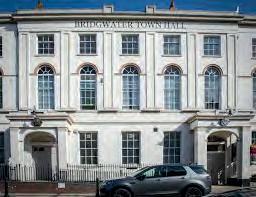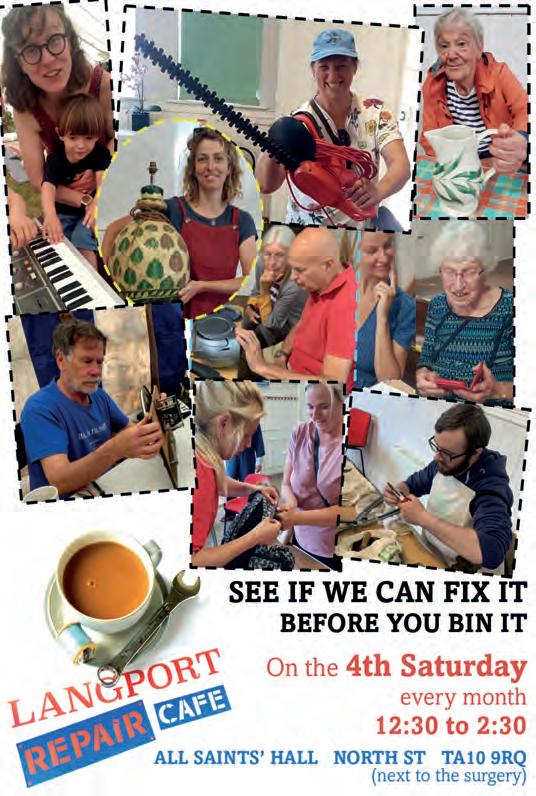


As Somerset faces a crisis in GP recruitment, figures show patients are struggling to get appointments and too often they are too short.





FREE

2
Places to findThe Leveller®
The Leveller® is now available in several supermarket outlets across the county. Please spread the word to friends and family. The paper will be available for one week from the 15 of the month at the following:
Bridgwater - Sainsburys
Bridgwater - Morrisons
Burnham on Sea - Tesco
Chard - Sainsburys, Tesco
Cheddar - Sainsburys
Frome - Sainsburys
Glastonbury - Morrisons
Ilminster - Tesco
Shepton Mallet - Tesco
Street - Sainsburys
Taunton - Tesco, Castle Street
Taunton-Sainsburys Hankridge
Wells - Morrisons
Wincanton - Morrisons
Yeovil - Morrisons
Yeovil - Tesco
New this month:
Pick up your Leveller® from Tesco in Wells!
Letters to the editor
Dear Mr Lee
Your editorial “An inconvenient truth” should be required reading for MPs and Somerset councillors alike. Why are we sacrificing our environment and agricultural land in a rush to build houses to satisfy non-existent local need?
Two decades of cheap finance is the major cause of house prices rising beyond the reach of families on average earnings. Demutualised building societies and other new entrant lenders able to tap the international money markets have competed for market share with imprudent lending policies (self-certified earnings, loans at 100% or more of property values etc). Northern Rock was the prime example! The “Buy to Let” mortgage has also emerged, fuelled by tax and other incentives and has encouraged private landlords to invest in domestic property. But public authorities are deterred from building social (council) housing by central government’s financial penalties and the requirement to give tenants “a right to buy”. As you rightly say, many developments do not fulfil any local need at all. This is so with the Lakeview development in our village, Keinton Mandeville. We have surveyed incomers door to door. All have moved from other, usually more expensive parts of the UK, in three cases from overseas. Even the occupiers of the limited number of social/affordable houses/flats in the development are not truly local. Local need is in fact very modest. It is not reflected accurately in the centrally-imposed housing targets and is certainly not met by executive homes with as many bathrooms as they have bedrooms!
Yours sincerely
John Cook Chair, SHOCK Campaign Group, Keinton Mandeville
Dear Editor,
Thank you for the two excellent articles covering planning policy, the climate emergency and second/empty homes “Fiddling with Nero” and “An Inconvenient Truth”. This is a subject which merits much greater coverage.
I recall that when my sister was married in 1984, she and her husband were able to purchase a 2 bedroom house in Stoke sub Hamdon for £22,000, around twice the average annual income. The average house price is now closer to ten times the average income. Inevitably this means that majority have less income left over meaning they are poorer and ultimately have to work longer before they can retire. Your articles highlight the inconvenient truth that high house prices are not driven by lack of supply. Whilst this may be an unpalatable argument to some, addressing these issues would be to the benefit to us all.
Theo Roberts Low Ham
Write to us:
If you would like to send us your views and comments on anything you read in The Leveller or anything related to our wonderful county, please write to the editor at: Leveller Publishing Group, Great Western House, Westover, Langport, TA10 9RB.
Editors’ Code
The Leveller® adheres to the standards set out in Editors’ Code. We operate a complaints procedure. If you wish to complain, please write to, or email the editor in the first instance (contact details as below).
Where to get your copy
The Leveller® is distributed on the 15th of the month via a network of local shops and pubs (see our website); we are very grateful for their support.
Our values
● Fair in our coverage
● Independent in our views
● Locally produced
● Promoting local enterprise
● Sensitive to the environment
● Careful with your data
Our Team
Editor: Andrew Lee: levellereditor@gmail.com
Staff Writers : Ancient Pistol: ancienpistolet@gmail.com
Writer at large: James Garrett
Sub Editor: Kate Roberts
Ad Manager: Ruth White levelleradvert@gmail.com
Ad Sales Executive: Juliet Barber levellermarketing@gmail.com
Art & Design: Rob Hutchinson
Advisory Board : Anthony Gibson, Paul Bell
Write to us at Leveller Publishing Group, Great Western House, Westover, Langport TA10 9RB
Advertise with us
We have a simple rate card offering ad sizes from an eighth of a page upwards. To request a rate card contact Ruth: levelleradvert@gmail.com or on 07973 758728
Juliet: levellermarketing@gmail.com 07544 737860
LevellerLive
For all our social media and online work we use the LevellerLive brand. You can find us on @LevellerLive on Twitter, Facebook, Instagram and YouTube.
For news between issues, go to our website: leveller.live
Copyright and
3
ownership All material, written and pictorial is © Leveller® Publishing Group unless otherwise stated and may not be reproduced, stored in a retrieval system or transmitted in any form, without prior express permission in writing. The Leveller® is an independent free newspaper published & distributed each month by the Leveller®
Group. It
owned by Even Handed Licensing Ltd of Great Western House, Westover, Langport, TA10 9RB. Regular columnists Alison Hayward, David Young, Guy Smith, Helen & Graham Walker, Jane Earthy, Jane Rodger, Lindsay Wright, Paul Adamson, Stephanie Harris Plender. Other contributors as credited. In-House Photos Andrew Lee, “Unsplash” or as per photo credit. Index to this edition Notices, letters and jobs Letters 3-4 Public Notices & Information 6 Jobs 41 Comment pieces Editorial 8 Political commentators 10-13 News Local News 14-26 Somerset News 1, 28-40 Business 42-43 Lifestyle My Somerset Home 44-59 Motoring 60-61 Culture/events 62-72
Publishing
is
Next issue dates: Copy deadline 28 September Publication date 15 October

Dear Editor
I recently received a 'thank you' newssheet from the LibDems. On its back page it had a bar chart showing each party's vote (LDs 55%, Cons 26%, Greens 10% and Lab 3%). The blue Conservative bar. was shown as being some 25-30% higher than their vote would actually justify. The Greens won 39% of the Cons vote. The bar chart shows it at about 30%.
This enables the LDs to do two things. The first is to make the gap between them and the Cons narrower than it actually is, thereby reinforcing the two-horse race narrative they've been so arduously promoting. The second is to give the impression that the Greens are further behind than they actually are.
I’m shocked that our new MP, Sarah Dyke, would allow this to be sent to all constituents as it is transparently deceptive.
I would be grateful, as I’m sure many would be, if she’d give us an explanation as to what happened, and maybe even an apology.
Regards
David Taylor Somerton
Dear Editor
I tried to participate in the GWR consultation on closing station ticket offices yesterday but having written my comments the send button froze!! I tried several times but I don't think their email system works. Anyway here are the comments on Castle Cary station that I tried to send them:-
There are three platforms at Castle Cary and two very high foot bridges between them. The booking office is currently very often closed as there is only one member of staff on duty and may be on the other side of the track on the opposite platforms assisting disabled passengers accessing trains for example. Disabled passengers on the opposite platforms have to be taken across the tracks at the eastern end of the platforms by the ticket office staff as there is no lifts or subways at this station, and the footbridges are too high and too steep.


The ticket office is next to the car park on the single London bound platform. All passengers have to enter or leave the station through the London bound platform using the footbridges to access the other two platforms.
This is already a totally unsatisfactory and unsafe situation, so don't close the ticket office, and keep guards on the trains!!!
Regards Bryan Pittman, Wells
Dear Editor,
In the many distressing stories about water pollution there is one point never mentioned... that most of the population are helping to kill natural life in our rivers by using lavatory cleaners.
Apart from a few outstanding eco products most cleaners have warning pictures of dead fish on them.. it is time they were prohibited.
Rebecca Pow said she was pursuing the manufacturers but nothing seems to have changed.
Brush and flush is all that is needed.
Janet Walford
Dear Sir
I try to read your paper as often as possible and I wish to say how much I find them a very good and fairly reported read.
However since the death of my wife last year I have been staying in my old home area of North Wales and have missed some issues, but I have followed with particular interest your continued reporting on the affairs of Watchet Harbour.
Regret I shall not be about to see the next issue as back home but do keep up the good work and keep on at the Council on this matter as I feel they are just not with it.
Yours sincerely
R D Overton Taunton
4 Letters to the editor

5 Advertisements
You should be able to get details of services and meeting dates via the contact details for your local council below:
Town Councils
Axbridge Town Council 07884 264033
https://axbridge-tc.gov.uk/
Bridgwater Town Council 01278 427692
Bruton Town Council 01749 813014 townclerk@brutontowncouncil.go v.uk
Burnham on Sea & Highbridge Town Council 01278 788088 townclerk@burnham-highbridgetc.gov.uk
Your Council Contacts

Castle Cary Town Council (01963) 359631 town.clerk@castle-cary.co.uk
Chard Town Council 01460 239567
Crewkerne Town Council 01460 74001
Dulverton Town Council 01398 324561 clerk@dulvertontowncouncil.co.uk
Frome Town Council 01373 465757 info@frometowncouncil.gov.uk
Glastonbury Town Council 01458 831769 office@glastonbury.gov.uk
Ilminster Town Council 01460 52149 town.council@ilminster.gov.uk
Langport Town Council 01458 259700 office@langport.life
Martock Town Council 01935 822891 or 07506 286382 clerk@martock-pc.gov.uk

Minehead Town Council 01643 707213
info@mineheadtowncouncil.co.uk
North Petherton Town Council 01823 574074
https://northpethertontowncouncil.go v.uk/
Shepton Mallet Town Council 01749 343984
info@sheptonmallet-tc.gov.uk
Somerton Town Council 01458 272236
town.clerk@somertontowncouncil.go v.uk
Street Parish Council 01458 440588
street.parish@street-pc.gov.uk
Taunton Town Council 01823 793637
Info@taunton-tc.gov.uk
Watchet Town Council 01984 633344 townclerk@watchettowncouncil.org
Wellington Town Council 01823 662855
info@wellingtontowncouncil.co.uk
Wells City Council 01749 673091 townclerk@wells.gov.uk
Wincanton Town Council 01963 31693
info@wincantontowncouncil.co.uk
Wiveliscombe Town Council 01984 631914 or TownClerk@wiveliscombe.com
Yeovil Town Council 01935 382424 ytc@yeovil.gov.uk
Somerset Council
Office hours (8.30-5.00) service: 0300 123 2224
There’s no email contact for the council
However there is a web page which allows you to report specific items to obtain information or make payment. Go to: https://www.somerset.gov.uk/contact-us/

6 Public Notices and information


Advertisements
Debanked or Unbanked?
First it was Nigel Farage, now it is Richard Tice. On the face of it, it certainly seems as if both businessmen have been refused bank accounts because of their publicly stated views. So, let us get one thing straight at the head of this article. The Leveller® is unconditional in its condemnation of any bank declining to offer a service on the basis of an individual’s political or personal views.
Whether you agree or disagree with Farage and Tice, they should not be refused bank accounts on account of what they believe. This view is – at least on the face of it – now being upheld by government. In July it was reported that Andrew Griffith, City Minister, had asked the CEOs of banks to reassure customers they will not be de-banked “for their lawful expression”.
And there we have a new word entering the English language. “De-banked”. So far so good. Two public outcries on behalf of two privileged individuals. Tice and Farage are both from well-to-do backgrounds, public school educated. Both finding an easy road into highly paid roles from an early age: Farage as a city banker (how ironic is that); and Tice as a property magnate.
Farage in particular said he wanted to campaign for those who found themselves in the same position as he was. He attempted to turn this into a crusade because he said he had heard of thousands of similar cases where people like him had been de-banked for their political views. There is a problem here though. And it is this. Farage, in particular, is the product of the banking world. Banks are not public corporations. They are not owned (with the embarrassing exception of Nat West) by the state. They are owned by shareholders. We may regard the service they run as essential, but if we do not like one, we are free to leave and take our business to another. Unlike other service providers, such as train companies and water companies, where (with some very small exceptions) we cannot choose who provides the service we want to take. You might believe that banks should be fully nationalised and provide a public service. If that were the case, then the state would have every right to dictate how a particular bank is run, what rules it enforces and, indeed, decide on any aspect of its modus operandi that it chooses. But it is highly unlikely that either Tice or Farage actually hold that view.
A disingenuous crusade?
What is especially interesting about Farage and Tice is that neither is really arguing for a fundamental right to have a bank account. They are arguing that those who have a bank account, should not have it taken away; should not be declined services without good reason. Which is in itself quite reasonable. It would be a lot easier to sympathise with their crusade if they had actually argued for a fundamental right to a bank account. But they didn’t and they don’t.
In the 1980s Nat West bank ran a series of ads suggesting that to open an account, you didn’t have to be a “bank account kind of guy”. The ads showed Ade Edmonson de-punking himself and dressing in shirt and tie to get a bank account opened. Only to find a “punk” in full punk regalia accessing a similar bank account at the counter next to him.

While we have every sympathy for their plight, what they are really asking for is a square circle. A banking system entrenched in the private sector, but with a rules base dictated by the state. There is nothing in law that suggests that a bank cannot determine who it lends to and on what terms. Unless of course it is money laundering or anti-terror legislation. Neither of which applied in the case of Farage or Tice.

NatWest said “no” to Farage
The idea was that anyone should be able to access a bank account. It is an idea that has fallen by the wayside. According to an FCA report published in 2019, 1.3 million people in the UK did not have bank accounts. What’s more, they were not denied bank accounts because of their political views. They were denied bank accounts because they were poor. And whereas those who are de-banked for their views may find it inconvenient (Farage complained he might have to move abroad) here we are talking about people who couldn’t afford to move to the next town, never mind abroad. We are talking about an underclass whose plight is beyond the ken of poor little rich kids like Tice and Farage.
Tice and Farage talk only about the “de-banked”. What about the “un-banked?”
These are the people who are preyed on by loan sharks. Credit Unions have campaigned hard in Somerset to provide an alternative to people who cannot access a bank account. At the very least to provide micro credit at affordable interest rates to stop those who are already poor and vulnerable slipping into the hands of those who would make them poorer still by charging exorbitant rates of interest.
Somerset has seen innovative schemes launched to help the unbanked. In 2021 money confiscated from convicted loan sharks by the England Illegal Money Lending Team was used to back new credit union accounts in Somerset. Somerset Community Credit Union launched the credit facilities to encourage residents to build up savings so they never have to turn to loan sharks in a financial emergency.
But it is not just loan sharks that hurt the un-banked. The UK fintech company, Pockit, conducted research into the problem of the “un-banked”. They concluded that they pay something in the region of £485 a year extra for things like electricity, gas and loans simply because they don’t have a bank account.
Which is why Lendology, a Community Interest Company that partners with Somerset Council was set up to provide loans in 2005. Their ambition is to provide access to low-cost, responsible finance making their lending decisions with people, for people and putting impact before profit.
These are great schemes. But they are schemes where providers with a community ethos have stepped in to plug a gaping hole left by banks. While we may have sympathy for Tice and Farage, they are powerful people with a platform. A platform that has been used to serve themselves and their own difficulties.
We should not lose sight of the fact that there is a much bigger problem here. The problem with the un-banked is they are not rich, powerful and they have no voice. They have been completely overlooked in all the talk and commentary on the “de-banking” scandal.
8 Andrew Lee Editor 15 September 2023
Leveller® Publishing Group Great Western House Westover Langport


9 Advertisements
Left page
Left Page, Right and Over !
The question we set our commentators this month was this:
"We have seen councils declare all sorts of crises: Climate, ecology, cost of living and most recently housing. Is there a point to making these declarations, does it lead to action of just talking?"
These are the politicians tasked with giving you an answer:
Left Page: Leigh Redman is a unitary, district and town councillor for Bridgwater and a Labour Party member.
Right Page: David Fothergill is a Conservative councillor for Monkton and North Curry. He is leader of the opposition on Somerset Council (SC).
Over The Page: Liz Leyshon is the Libdem Unitary Councillor for Street and is Deputy Leader of SC.
Green Page: Martin Dimery is the Green Party Leader on SC and candidate for Somerton & Frome constituency


The Left Page by Leigh Redman
I think the answer to this question this would depend on what your expectation is for the action/outcome you want from the declaration. What do you want from declaring the crises?
Declaring a crisis can serve as an accelerator for creative action and innovative outcomes. Many of the crisis declared by councils are not of their making, so sometimes declaring a crisis might be to allow councils to ask others for action or support in dealing with the aftermath. Declarations of a crisis can focus on systems and structures rather than dismiss inequalities as the fault of individuals. However, simply declaring a crisis does not necessarily lead to action. Effective communication is necessary to ensure that clear communication goals and key messages are established to support your actions. Governments may find it in their own best interest to make the problem appear as difficult as possible, to avoid culpability for failures, something this current government is good at.
Somerset has declared a number of crises that include cost of living and environmental, putting in place a ‘climate emergency strategy’ for the latter, with more recently Frome town council declaring a housing crisis, in their case drawing attention to a problem but the solution is in the hands of others.
It's important to note that the specific actions taken by councils can vary depending on the nature of the crisis and the area in which they operate. As a new unitary council, Somerset’s shape should make the route to a solution easier. Additionally, the effectiveness of these actions can be influenced by factors such as political will, available resources including finance, and community engagement.
Let’s not forget Somerset council has its own issues to deal with, mostly around its finances.
After declaring a crisis, councils can take various actions to address the issues at hand. Here are some examples:
Mobilising resources: Councils may allocate additional funding and resources to tackle the crisis.
Implementing policies and regulations: Councils may introduce new policies and rules to address the crisis.
Collaborating with stakeholders: Councils often work with various stakeholders or partners, including community organizations, businesses, and experts, to develop and implement solutions.
Raising awareness and education: Councils may launch public awareness campaigns to educate the community about the crisis and promote behaviour change.
But in summary, I think, declaring a crisis can serve as a starting point for action and innovation, but effective communication and leadership along with the availability of funds are necessary to ensure that the declaration leads to meaningful change, and of course, as long as that change is within a councils control.


10
Right Page
by David Fothergill
When we are dealing with such important issues as the future of the planet, where people live, how they live and even how we protect our most vulnerable of animal species it sounds a bit glib to quote ‘Actions speak louder than words’. But that can be everyone’s first reaction to hearing that another crisis has been called by politicians, either local or national.
I hope that those same politicians would have sufficient integrity to know that it cannot just be about calling another crisis. I hope that they would understand their key leadership role in making physical, practical and far-reaching changes to begin to address these issues, promoting solutions such as active travel, sustainable development, land management and personalised support. However, these may not always be popular decisions with residents when they can easily and directly impact their lifestyles – just how do people feel about using their car less, large nearby developments, fields of solar panels and intrusive personal financial assessments.
If it is the case that local politicians are implementing a comprehensive response despite these public concerns, then calling a crisis can add significantly to the toolbox, highlighting and thereby influencing public opinion by addressing the wider context. The housing crisis recently called in Frome illustrates the point that if nothing else it has created a discussion, increased awareness and brought focus on the need to find a solution.
Of course, if that wider practical response is not there from politicians, then the public will become very cynical very quickly and will inevitably become disillusioned with this and any other crisis in the future.
Which brings me to my final point. Whilst all of the crisis areas currently being called are noble in their intent there are others just as pressing but perhaps less publicly attractive to acknowledge. Who will be the first Council to call a crisis in mental health support? The first to call a crisis on our aging population (a major issue in Somerset)? Or a crisis in health inequalities which is driving obesity, drug addiction, alcohol consumption and increasing early deaths? To name but just a few. These may not be fashionable, but they are no less important. This then takes us full circle, it’s not just about words but actions and who is going to be brave enough to show true leadership and begin to tackle these? After all, actions do speaker louder than words.




11
page
Right
Over the page

 Over
Over
the
Page by Liz Leyshon
Crisis is an emotive word at any time, and its meaning can vary across circumstances and differ in meaning for individual people. Recently one of my colleagues, Cllr Mike Rigby, referred to one of the crises that has been in the news recently, I think it was Frome’s declaration of a housing crisis. Mike said that the climate emergency is an ‘existential crisis’ and that it put the other crises into perspective.
That led me to think of all our declarations of crisis and how they can make sense as a hierarchy.
Then The Leveller question arrived in my inbox.
Climate, Ecology, Cost of Living, Housing may be listed in that order for chronological reasons, but as a new Mendip District Councillor in 2019, we heard from the Housing officers that we were already in a housing crisis. At that point specialist officers, colleagues and I tried to find ways to deliver more social housing for rent, with development plans that would take care of the land around the homes, that would give greater energy efficiency and, most of all, give people a decent home at a decent price.
So far none of that housing has been delivered.
It’s partly because of what we call the ‘phosphates’ situation, and partly because we could not convince people that to have decent homes built on specific available land would help the housing crisis, because they had valid concerns about the overarching crises of environment and ecology.
In the meantime, the cost of living crisis has certainly hit home. We’ve gone from not being able to leave our homes during lockdowns (without good reason) to not being able to heat homes and stay inside in comfort. That concern clearly overlaps with our need to reduce energy consumption and address our lack of sustainable energy sources, and now we find waiting times for connections to National Grid running into decades, not just years.
I doubt many people know about the situation with National Grid but we need to understand. Large scale development of, for instance, solar parks is now on hold, while National Grid plc quotes on the stock market.
Clearly a major part of our ‘existential crisis’ is a crisis made by human beings. Here we are, unable to help the production of sustainable power at scale because a profit-making company can’t provide the necessary connection until the 2030s. The Financial Times has recently reported on how that lack of connection to the grid will reduce economic growth. That’s not difficult to understand but extremely difficult to condone.
Until or unless we find a better way to run more sustainable utilities, build properly affordable housing, and reduce food waste, we’ll continue to talk about many different crises, and not do anything like enough to make a difference.


12
Green Page
by Martin Dimery
Carla Denyer, co-leader of the Green Party of England and Wales, was the first politician in Europe to advocate declaring a Climate Emergency. She did so as a Bristol City councillor in 2018. The motion was successfully passed and there followed a wave of such declarations in councils across the country. My Somerset Green Party colleagues Shane Collins and Dave Mansell successfully proposed the same motion when serving as Mendip and Somerset West and Taunton district councillors, respectively.
Somerset County Council then declared a climate emergency with almost unanimous agreement. Now, as a single unitary council, Somerset has to integrate and make sense of the environmental policies of five different councils. When appointed the first ever Chair of the Scrutiny Committee for Environment last year, part of my role was to examine the various initiatives and try to assess their effectiveness. My earlier cynicism was soon dispelled when I recognised just how much work officers had done to incorporate environmental policies across the county and districts. This included tree planting, bio-diversity, building development and recycling strategies, for example. The County Council had begun restoring and creating public buildings to lower carbon emissions and replacing streetlights with low energy LED bulbs amongst many other initiatives.
Despite the above, progress is slow. The Environment Scrutiny Committee has been re-purposed as Scrutiny for Climate and Place, incorporating a much larger brief due to practicalities of unifying the various councils. This gives us much less time to study each area in depth and doesn’t help speed up the implementation of environmental initiatives.
When I read that the local council of my hometown, Frome, recently declared a “housing crisis”, my instinct was to wonder what difference this would really make. After all, towns and parishes only have an advisory role on planning matters. At a parish council meeting I attended in recent months; a housing developer was asked to consider providing air sourced heat pumps instead of soon to be outdated gas boilers. The developer agreed, only to discover the National Grid had not the capacity to supply the necessary power to the development.
Despite this, I support Frome’s initiative. It is important for our towns and parishes to ramp up the pressure on the County and on developers. Similarly, it is important for authorities like Somerset to maintain pressure on central government to provide the means to help us implement our emergency measures.

Unfortunately, in signing contracts for over one hundred gas and oil drilling sites in the North Sea, our current Prime Minister has all the climate credibility of an arsonist in charge of the Forestry Commission. We need real leadership from central government to act quickly and effectively if we are to achieve our emergency measures.



13 Green Page

TheView from Langport By Cllr Sean Dromgoole
August was supposed to be quiet. Everyone was supposed to be away. Nothing ever happens in August. But in this quiet month we managed to…
Publish our Community Plan for Huish Episcopi and Langport (your copy is waiting for you on our Parish website). It’s a cracking read even if I say so myself.
We have been invited by ABP (the meat processing plant and our largest employer) for a tour of their spectacular plant just to the South of us.
We’ve persuaded Wessex Water to come and meet us about various issues of the smelly variety. If I’m entirely honest I don’t really understand how the stuff that happens in Langport is then treated, above us, on a hill away to the West. How powerful can a flush be? There must be a pump, right?
We’ve got a beautiful new road surface going halfway through the middle of Langport – it makes snooker tables look like ploughed fields. Its like driving on soft cream. I love the new road. The nice people from Highway Maintenance agreed to do it in the evenings to minimise disruption to schools and businesses, but it was still a bit odd not being able to walk from one side of the town to the other at night. Does feel worth it now though.
We have sorted what’s happening with all the amateur Isombards who have built poxy little bridges from the back of their houses over the rhyne and onto our cattle populated moors. Sadly, the cattle’s
approach to bridge testing is a danger to themselves and anyone culpable who meets their owner. We’re on it – so to speak.
We’re also hosting one of Sarah Dyke’s first surgeries since she was elected as our new representative in Parliament. We are delighted to be amongst the first chosen. Needless to say, there are plenty of things that we’re doing that I think she can help with, so I have booked my slot!
But all this is as to nothing compared to our big news! We are going to have a new market. Not for the sake of change, but because it is time. It will be local produce only. The original idea was that everything had to be within 10 miles but that felt limiting. It’s going to be called “Langport Local Food Market” and I am very keen that you try it. It will be on the first Saturday of every month March to December, starting on October the 7th. It will run from 10am to 3pm. There will be local cheeses, wines, sauces, jams, beers, ciders, gin, pastries, chocolate, coffee, pizzas. Fruit and veg and flowers. It is all the brainchild of brilliant Peter Roberts (who did the Kitchen Bakery and Kitchen at the Wharf). We are all tingling with excitement about it. Please come and if you know of stall holders who might fit the bill please encourage them to get in touch with us at LangportLocal@gmail.com
So that was August. Now for a proper month…
Sean Dromgoole is the Chair of Langport Council
South Petherton loses Post Office (again)
After the closure of the South Petherton Post Office last year, the service was taken on by local newsagents N&D News. N&D News is on St James’s Street, not far from the old Post Office. In principle it was a perfect fit.
However it hasn’t worked out that way. At the beginning of August the Post Office service closed. We should stress that in all other respects N&D News is trading as before. In a notice published for customers
the owners explained that: “the stress and strain to our health from taking on the Post Office has been too much for us over the past couple of months. Hopefully, someone else will be able to take on the Post Office in due course.” Many will sympathise with their predicament. It is worth noting here that Somerton hasn’t been able to find anyone to take on the Post Office since it closed in March 2022. Nor has anyone been found to replace the Post Office in central Frome.
Skate Park money mystery
A decade ago, a new housing estate was bult at the back of Old Kelways on the Somerton Road. As ever with these things, the developer was asked to make a contribution towards the local infrastructure. This is to compensate for the strain on said infrastructure created when lots of new houses are built. The amount is settled in what is known as a section 106 agreement. In this instance part of the money set aside under the s106 agreement, was £66,000 to be used to build a new skate park at the Memorial Field. The old one having fallen into disrepair and been scrapped.
The idea behind a new skatepark came from a canvassing of local opinion immediately prior to the s106 agreement being agreed. It is clearly still a popular idea as when the Town Council surveyed residents, a large number of respondents said they would like a skatepark.
Other Post Offices have closed in Charlton Adam and Curry Mallet without any nearby replacement being found.
If the Post Office wants to provide the service that is mandated by government, perhaps it needs to try a bit harder to make the deal attractive for the postmasters. If people are voting with their feet, that must say something about the deal on offer, and the support available from the Post Office.
The problem is no-one seems quite sure where the money has gone. South Somerset District Council negotiate s106 agreements and they get any money paid under them by developers. It is then up to SSDC to distribute the funds.
We asked Somerset Council (as successor to SSDC) and they were unable to tell us if the money had been retained or not.
We asked if SSDC had reallocated the funds to the Octagon Theatre, but again no-one was able to tell us.
Meanwhile the Memorial Field Committee have expressed interest in diverting the funds to be able to build a new toilet block with disabled facilities and additional ladies and baby changing units.
Having originally budgeted for a cost of £28,000 they now are faced with costs over £50,000 for the same project.
Meanwhile Langport has no new skate park, no new toilet block and nobody seems to know where the money has gone.
14 Local News - Langport, Somerton and villages


15
Somerton in the vernacular
Something The Leveller® has been remiss in failing to flag up is the presence of the Somerset Vernacular Building Research Group in Somerton. At least, they hold their monthly meetings in the Parish Rooms. The Group can trace their origins back to 1979 and initially set up home in Glastonbury.
The Group’s purpose is to record and study the traditional houses and buildings of the historic county of Somerset. In particular the smaller manor houses, farmhouses, cottages and farm buildings which are of an identifiable local style and built of local materials. They have a membership of about 60 people from all walks of life who simply share a common interest in traditional buildings. The Group meets on the third week of the winter months and arranges visits in the summer. You can find out more about them at svbrg.org.uk
And if that sounds interesting, you might like to know that their next meeting is on 20 September at 7.30pm. The guest speaker will be Emma Norris from the Crewkerne architectural conservationists Humphries and Jones.
She will talk about her work on the restoration of the Cosmatesque glass pavements in Sherborne Abbey, gilding work for the coronation of King Charles and restoration work at Low Ham church, otherwise known as “The Church in the Field”. The latter involved removing some inappropriate paintwork to reveal the original beautiful painted surface underneath.
20 September 7.30pm at the Parish Rooms, Market Place, Somerton. Non-members welcome: £2
Bus time changes
From the start of this month there will be further changes to the 54 bus service which connects Somerton to Taunton and Yeovil. A composite timetable including Langport timings is available from martynandsue@hotmail.com or you can get a hard copy from Somerton library.
From Monday 4th, the 54 will depart Taunton, Langport and Somerton 5 minutes earlier but arrive in Yeovil at the same times as previously.
On the return journey, they will leave Yeovil at the same times as previously but be 4 minutes later from Somerton, Langport and into Taunton.
They will leave Yeovil at 0700, 0840, 1040, 1240, 1440, 1640 and 1840 taking 34 mins to Somerton, 48 mins to Langport and 85 mins to Taunton.
They will leave Taunton at 0710, 0905, 1105, 1305, 1505, 1705 and 1815 taking 38 mins to Langport, 50 mins to Somerton and 85 mins to Yeovil.
The reason for the change appears to be the fact that having altered the route of the 54 through Yeovil the buses were routinely running over 5 minutes late. The altered timetable “normalises” the service times. Of course since First Group brought in the new timetable a year ago, a once hourly bus service has become two hourly. The through service was briefly cancelled with a break in service at Somerton. That proved unpopular and the through service has now been restored.

The Somerset Day
15 September
Sunrise 6.46 am
Sunset 7.25 pm
15 October
Sunrise 7.34 am
Sunset 6.18 pm
From Picts Hill to Poland
The reputation of Kelways for their peonies has been long and illustrious in the UK. But their plants have reached a global audience. Even so it comes as a bit of a surprise when you stumble across something familiar in an unfamiliar surrounding. Which is pretty much how it felt to Harry Porter who was impressed enough to take the photo to the right when he saw the sign in the botanical gardens of the ancient Polish city of Krakow.
It was a bit too late in the year to see them in bloom, but even so a pleasant surprise.




There is also an extra bus from Wrantage to Strode College in the morning and return in the late afternoon on Strode College days. Yeovil College are also running their own bus service for students in the Somerton, Langport and Ilchester areas. You can be picked up and delivered straight to the door of the college. If you’re a student at Yeovil College and want to use the service, contact 01935 423921 or iZone@yeovil.ac.uk

West Street roadworks
Wales & West Utilities will be carrying out what they describe as “essential gas mains upgrade works” on West Street in Somerton. The current plan is that work will start on 18 September and barring any unforseen issues, will be completed by 22nd December. Due to the location of the gas main and the nature of the engineering works involved, traffic lights will be in place for the duration of these works to ensure the safety of the operations team and road users. Given the way the one way system operates in West Street, this is likely to be extremely disruptive.

16 Local News - Langport, Somerton and villages


17 Advertisements
School Closure Alarm….
Haygrove Hiatus
Haygrove School in Bridgwater has had to open for the autumn term in temporary accommodation arranged by the Department for Education. As the school put it with masterful understatement when writing to parents: “This is far from an ideal situation and not what our valued colleagues and students deserve.”
So what went wrong? Funding was announced back in 2015 to build a new school under the Priority School Building Programme Phase 2.
The intention was to improve some of the older parts of the Durleigh Road site in Bridgwater. The famous old quad buildings dating back to Dr Morgan’s Grammar School days were demolished to make way for the new buildings. At the time the school said: “This is all good news for Haygrove School, but we do recognise that other schools in the Bridgwater area have not been so fortunate and are in urgent need of additional funding to maintain their accommodation. We hope the relevant funding bodies will do everything in their power to support these schools too.”
Building company Caledonian Modular were awarded £38m for the contract to build both Haygrove School and Sir Frederick Gibberd College in Harlow. The new buildings at Haygrove were duly opened in time for autumn term 2020.
The design of the new buildings was prepared by HLM. However, it has since emerged that the architects had a “number of concerns with Caledonian’s approach” as the projects progressed. Philip Watson, head of design at HLM, was recently quoted as saying: “HLM Architects were initially employed by Caledonian to design Sir Frederick Gibberd College and an extension to Haygrove School. As these projects progressed,

we began to have a number of concerns with Caledonian’s approach to the technical delivery of the design to meet the DfE’s high quality output specification. Unable to resolve our differences, we parted company with Caledonian and the projects were delivered by others.”
The architects may have pulled out, but the project went ahead anyway.
Caledonian Modular collapsed into administration in March 2022 while it was in the process of building two further schools at Launceston and Newquay. Both were subsequently demolished. Another school built by Caledonian Modular, Buckton Fields Primary School in Northampton, has been closed because Education Minister Nick Gibb said that a DfE review: “identified issues that related to the structural integrity of the buildings, weakening its ability for example to withstand extreme events such as high winds or a big snowfall or indeed a collision from a vehicle.”
The construction company went into administration after revealing losses of £11.2m in the year to 31 March 2021 and made a further loss of £10.7m for the following six months. The assets, records and goodwill of the company were bought from the administrators by JRL in 2022 for a sum believed to be just over £6m.
Back at Haygrove, return to the autumn term last year was delayed when a window fell out raising concerns about the building. This summer, the DfE undertook surveys of the school buildings and decided that the main school building was not safe to use until further notice.
…..And false alarm
Concern was raised for pupils at Milford Infants’ School today, by local MP Marcus Fysh. The MP for Yeovil posted on social media that the school would face significant disruption. Not the sort of message parents, carers and students want to hear with a new term due to start the following week. Mr Fysh (pictured below) said he had spoken to education ministers and had learned that the state of the concrete used in the building posed a significant risk.
The MP went on to say he would speak to the CEO of Huish Academy Trust. Milford is on the north side of Yeovil, but is part of the Huish Academy Multi Academy Trust. The MP stated that his aim was to ensure disruption was kept to a minimum.
He added that he was sorry about all the disruption this would cause and that his heart went out to the children. He offered to stand ready to help in any way he could, especially those children with Special Educational Needs.
With the new term now on the horizon, the message was alarming for parents. Large numbers tried to get in touch with the school to find out what was going on. Specifically, why were they only being told about a problem at the last minute. However, having seen the social media post the school promptly put out a message of their own. It appears to completely contradict the warning from the MP. “Dear Parents and Carers, With regard to the incorrect post that has been made on social media, we would like to assure you that Milford Infants’ School will not be closed and we are looking forward to welcoming our families back to school as planned on Tuesday 5th September.
We have been assured by the Local Authority that the school is safe and they will be providing a statement in response as soon as possible.”

Subsequently the MP changed his original post. The revised post said that there was no issue with the concrete and no risk of the school not opening on time.
The Leveller® contacted Somerset Council to ask for some reassurance. They confirmed there was not, and had not been, any concern over the structural safety of the school. They also confirmed it would open on time for the new term. Which it duly did.
Bridgwater Labour’s Alex Martin, a lawyer and former teacher, expressed concerns at how the contract to build the school was awarded. “There are significant price and environmental benefits to modular building projects and they will rightly feature in our future construction mix, but we must ensure that both the workmanship and financial integrity of manufacturers – and everyone else along the supply and build chain – is properly assessed before handing over to them public funds that are in short supply as it is. Why was Caledonian Modular selected for this build? Was the process competitive? Who signed off on building safety? The DfE, Haygrove School and Quantock Education Trust have questions to answer. I doubt this would happen at Eton.”
Leigh Redman, Labour Leader on Somerset Council noted that the end result was considerable disruption for pupils. “The school will not be open to all pupils as planned on Monday 4th September. Year 11 will start on 11 September, Year 10 on 18 September (at the college site). A date for Year 7-9 will be announced when timescales are confirmed for the temporary arrangements to be on site.”
As we went to press there was no further update. Cllr Redman added: “Although Somerset Council had no input to the original build, officers from the council have been working with the school and trust to assist where necessary. I have already been contact by parents, whose children are super worried about their GCSE’s as they are going into year 10, especially as these are the same young people impacted previously by Covid. I am considering calling the Regional schools commissioner (DfE representative in the SW) in to our next Scrutiny meeting to get some answers from DfE about how this could happen and what they plan to do for all pupils at the school.”
18 Local News - Towns


19 Advertisements

Rule from Bridgwater
When the elections took place for the new Somerset Council in May 2022, the LibDems won a handsome majority. The council would continue as Somerset County Council for a further year before morphing into Somerset Council on 1 April this year.
In the build-up to to the decision to create a new single unitary authority, there had been much angst in the north east corner of the Somerset Council area.
Being ruled from Taunton was the antithesis of everything Frome wanted for itself. The area around Frome, given a choice, would rather have joined Bath and North East Somerset (BANES) than been absorbed with the rest of Mendip into Somerset Council. The only problem being that BANES didn’t actually want them and was in any case far more engaged in becoming part of a West of England Combined Authority centred on Bristol. In any case, no one in central government was really listening to the good folks of Frome, and they were unceremoniously shunted into the new Somerset Council.
Meetings on the move?
With no district councils, 110 new councillors and a large area to cover, the new administration started out by trying to move council meetings around the county. Perhaps to counter the notion that Somerset Council ruled from Taunton. The first three meetings were held variously at Oake Manor Golf Club Taunton, Westlands Yeovil, and Hollinsworth Hall, Canalside, Bridgwater.
Cllr Jason Baker, a Chard Town Councillor and Somerset Councillor too, has been removed as a representative of the Culturally Chard consortium. Cllr Baker was a member of the consortium representing the Chard & District Carnival Committee (not in his capacity as a councillor). The action was taken by Chard Town Council and Somerset Art Weeks (SAW) via a letter to Cllr Baker dated 18 July.
The lead members of the consortium suggested to Cllr Baker that their action was reasonable “given the incidents of bullying behaviour” as well as citing behaviour contrary to the constitution of Culturally Chard. A letter signed on behalf of Chard Town Council and seen by The Leveller® cited several incidents. These included:
1. Bullying and intimidation at a launch meeting of Culturally Chard which led to a complaint being made by SAW.
2. Bullying and intimidation on the morning of the Chard Spring Festival (28 April) which led to a grievance being raised by Chard Town Council’s operating officer.
3. Disruptive behaviour during the Chard Spring Festival.
4. Bullying behaviour during a meeting on 18 May to discuss the custodianship of stage and lighting equipment.
5. Intimidating behaviour at a meeting of Culturally Chard on 8 July.
6. Failure to respond to repeated requests to provide information as to how Chard
So far, so good. The next logical move was surely to choose a venue in north east Somerset. The Cheese and Grain (pictured) perhaps, or the Mendip offices in Shepton Mallet. It never happened. Instead, the idea of a peripatetic council was abandoned and all full council meetings ever since have been held in Bridgwater. Which in terms of getting there from Frome, especially on public transport, is about as inconvenient as it gets.
It’s not too bad for the Leader of the Council who by happy coincidence lives in North Petherton, a mere seven-minute drive away.
While Cllr Revans is not the sort of man to let that influence a decision on a meeting venue, in an authority with such a large rural area to cover, it is disappointing to see all the meetings happen in one place and a relatively inaccessible one at that.
We asked the council why they were no longer moving meetings around the council area. They explained that every venue was selected after being measured against a strict set of criteria –including cost, acoustics, break out room facilities, car parking, public transport and disability access among many others.
Apparently Bridgwater and Westlands in Yeovil came out best. However a council spokesperson also told us Bridgwater and Frome came out cheapest in their assessment and that the venue they had looked at in Frome did not have space available at the right time.

Meanwhile, anyone wanting to attend a meeting from Frome or indeed most of Mendip, will have to wend their way to Bridgwater. Either having to drive or run the gauntlet (for several hours) of a creaky public transport system. Holding meetings in Bridgwater may be many things. It is probably the worst location the council could have chosen in terms of environmentally-friendly public transport.
For those in Frome, rule from Bridgwater is the sort of end game that might actually make rule from Taunton start to feel appealing.
Culturally Charred
Carnival will deliver key Historic England criteria (Historic England have provided substantial grant money to Culturally Chard).
Right of reply
When we asked for his reaction to the accusations, Cllr Baker told us: “I was astonished and shocked to receive the letter from an officer at Chard Town Council on behalf of Culturally Chard, to the best of my knowledge this action and the contents of the letter have not been authorised by the council.” Addressing the complaints in the letter in order, Cllr Baker told The Leveller®: 1. I am unaware of a complaint in 2021, this would have been made through the monitoring officer and I have not received any correspondence regarding this.
2. I am aware that I have been accused of bullying and intimidation when collecting equipment on the 28 April that was loaned to the town council by Chard Carnival Committee but to date have not been supplied with copies of all the complaints or been given the opportunity as a member of the public to attend any meetings to discuss or reply to this. I dispute that I behaved in a way that could be a proper basis for a grievance as raised by the Council staff.
3. I never attended any part of the event held on the 28 April so could not have disrupted it in any way.
4. I dispute behaving inappropriately at the Culturally Chard Meeting on the 28 April, surely if there was an issue it would have been raised
at the time or reported to the town clerk, I have not been provided with any evidence of any inappropriate behaviour at the meeting to date.
5. I dispute behaving inappropriately at the Culturally Chard Meeting held on 8th July and have spoken with another member who has confirmed that he did not feel I had acted inappropriately. I did ask for a copy of the recording as a town council officer disregarded the confirmed ownership of Chard Carnival Committee property and sought to continue to remove it, I felt that this needed escalating to the town clerk and Somerset Council.
6. It has been confirmed by Somerset Council officers that Chard Carnival Committee have a grant that is available to be drawn on for 2 years (2022 and 2023) which means I do not need to bid for funds for 2023, I am unsure why Chard town council officers are trying to stop Chard Carnival from using grant money they have been awarded, if they continue to do this it may mean that Chard Carnival will be cancelled this year.
The Leveller® confirmed that Chard Town Council had sent the letter to Cllr Baker and asked if a new member had been proposed by The Carnival Committee to replace him. The Council issued us with a statement that reads: “The Culturally Chard Consortium is currently in communication with The Chard & District Carnival Committee Ltd regarding their representation on the Consortium.”
20 Local News - towns




Advertisements
Wells says no to Old Police Station plans
At the August planning committee of Wells City Council, an application to redevelop the Old Police Station in Wells into retirement units was examined. The application seeks to provide “Retirement Living Apartments for Older People (Sixty Years of Age and/or Partner over Fifty-Five Years of age), Guest Apartment, Communal Facilities, Access, Car Parking and Landscaping.”
The plans may sound familiar to some of our Wells readers, and with good reason. Mendip District Council has previously approved an almost identical application for this site which has already been granted to the developer, Churchill.
That decision accepted that the developer could not realistically provide affordable housing within the site, so asked for £434,404 to fund alternative off-site affordable housing. In addition, they were asked to purchase 6.73kg/year of phosphate credits at the Yew Tree Farm phosphorous mitigation scheme and associated land management plan for the ongoing management and maintenance of that site. That would cost the developer in the region of £370,000.
And finally, they should pay just under £14,000 to mitigate the pressure on the local GP service in the city.
And that was that.
Except, having secured the principle of development, the developer has come back and suggested that the site is no longer viable with the Affordable Housing payment. The application 2023/1275/FUL is new. Trying to get out of paying for Affordable Housing is nothing new. They’ve been doing that in Somerset for over a decade. And the method is nearly always the same. Get permission first, then offer some numbers subsequently to show you can’t afford the Affordable Housing element. Then lean on the Planning Authority hard to get it all ‘forgiven’.
You choose
What makes this application different is that the main reason Planning Issues, the consultancy acting for Churchill Retirement Living, give for the developer not being able to afford the Affordable Housing contribution, is the cost of purchasing the phosphate

credits. In effect, they are saying you can have either Affordable Housing or phosphate credits but you can’t have both.
Phosphate credits are required in Somerset because of the state of the Moors and Levels. Assessed by Natural England as ‘poor’ and deteriorating because of the level of phosphates in the soil, a moratorium was placed on all new development. Why? Because the two main sources of phosphates are considered to be sewage and agricultural effluent.
So, in order to get permission to go ahead with a development, a developer is required to mitigate the amount of phosphates that would be produced by the sewage coming from a new development. Interestingly, as we write this Michael Gove (Secretary of State for Levelling Up, Housing and Communities) is suggesting that Natural England has been overzealous in pushing for this sort of ‘nutrient neutrality’ approach. If he gets his way, the whole system will be ripped up. Good news for developers in Somerset, at least, bad news for the environment.
While Wells City Council’s Planning Committee is only a consultee (the final decision on the Old Police Station rests with Somerset Council) they were not impressed with the new application. They recommended refusal.
Cllr Denise Denis who chairs the committee told us they had two main concerns with the application.
Firstly there was, she felt, inadequate parking provision: 19 spaces for 47 apartments which is less than half the requirement of one parking space for each flat.
Secondly, they objected to the lack of affordable housing. They noted that affordable housing is in very short supply across all the demographics in the population of Wells. They noted that the Local Plan asks to maximise the delivery of affordable housing and deliver a range and mix of house types and sizes to meet the variety of local housing needs in both the open market and affordable housing sectors. She added that: “The Planning Committee would like to see any Housing Development contain provision for affordable housing and it was not even a wish to see the offsetting of the affordable housing needs with monies to other developments that would satisfy the requirements, as land space within Wells is limited. Older people who do not have the means to purchase accommodation of this type have very few opportunities to live in Wells and we believe there should be provision made for them by developers”.
What is interesting is that the previous planning application (2020/2234/FUL) for the site was only determined in April this year. And new papers and materials were being submitted by the developer right throughout the process. Yet we were unable to find any mention of phosphate credits or Affordable Housing being unaffordable. However, just four months later, the City Council is being asked to give an opinion on a new application where apparently the financial matrix is very different. It is certainly an interesting suggestion.
Where’s our post?
Over the past few weeks the post in Ilchester has been, let’s be generous and say, erratic. Residents have been complaining that there hasn’t been a regular daily delivery for some time.
Several readers got in touch to ask if we could find out why. It appears that some 20 members of staff left the sorting office that handles Ilchester post over the course of the last year. The Leveller® approached Royal Mail plc, the organisation that now handles mail delivery for a comment.
A Royal Mail spokesperson told The Leveller®: "We are sorry to residents who have experienced delays receiving their mail. Improving our quality of service is our top priority and we are committed to restoring service levels to where our customers expect them to be.
The local service has been impacted by high levels of vacancies. This has led to delays in the area. However, we have new staff joining the business in the area and every effort is being made to ensure post is delivered on time. Those who do not receive their mail on the day they expect will be prioritised the following day.
We encourage anyone with concerns about the delivery of their mail to please get in touch with Royal Mail customer service on 03457 740 740 or via www.royalmail.com.”
22 Local News - towns



23 Advertisements

You’ve got to be joking!
As I write this there is a heatwave on so it doesn’t sound like complete madness. But, as we head into autumn the idea of swimming in one of our rivers as the temperature drops leaves me, well cold.
But the hardy souls that comprise the Friends of French Weir Park in Taunton are made of sterner stuff. This September they are going to be providing extra support for local people who want to try their hand at wild water swimming.
Believe it or not there has been quite a lengthy tradition of swimming in the River Tone near this spot. The first bathing area built in French Weir Park was created in the 19th century and a second bathing area was built in the 1920s.
French Weir Park is near the town centre and next to Long Run Meadow. The park can be reached via the Castle Street Tesco and French Weir Avenue. The Friends look after the spot and keep it clean and in good nick. Until the end of the month, they’ll also be providing supervised swimming in the Tone from 9.30am to 2.30pm. To make life easier, you access the river from the steps next to The Weir Cafe in the park and a qualified lifeguard has been booked and a first aider will also be on duty.
Before you ask the obvious question, they’ve already thought of it. The Environment Agency (EA) designates the Tone in Taunton as being of “moderate” quality. It’s not that people don’t trust the EA, but the Friends group will be testing water for any bacteria every Saturday morning anyway. They’ll display their test results, along with the water temperature, so you know precisely what you’ll be getting into. Even so they recommend you keep your head out of the water “just in case”.
Janine East, Chair of the Friends group is trying to encourage more of you to take the plunge: “seasoned swimmers have been swimming here almost every day for years, they belong to the Bathing Station group on Facebook. We wanted to make extra provision though, for a trial period, to reassure people who are new and introduce them to wild swimming as people often have many questions before taking their first dip! We’re making additional provision for a month so people can try out wild swimming with support, which we hope they’ll find reassuring for their first couple of swims, particularly for people with children.”
Row over bus depot rumbles on
Last month we reported that Simon Goff, Managing Director for First Bus South was planning to close the Bridgwater bus depot. This is where drivers are based and buses are kept when not in use. The bus station in Bridgwater is not, for the moment, under threat.
Following the announcement in August, Bridgwater Town Council Leader and County Councillor, Brian Smedley, said that he would meet Mr Goff to discuss the future of the depot and indicated that Mr Goff had agreed to a meeting. Following an

exchange of letters, Cllr Smedley believed a meet would be arranged. A series of protests in support of the depot were organised by local residents and the Bridgwater Trades Union Council. Then on the last day of August Mr Goff put out an announcement confirming the closure would happen four days later on 3 September. Mr Goff said: “This is not a decision we have taken lightly, but one that is a necessity in order to protect the future of Buses of Somerset and its bus network for the local area. I am aware that there has been some local resistance to the depot closure, but it is important that our decision is taken in the wider context of striving to secure the long-term future of services across Somerset.”
He also claimed that the decision was taken: “Following further consultations and discussion with local stakeholders and customers alike…” It is less clear who these were. Certainly they do not appear to have included Cllr
Smedley. Commenting on the closure, he noted: “Mr Goff said he would meet and we cleared the calendar to do this but he had no intention of meeting before the closure and no intention of not closing down the depot. This decision is NOT driven by necessity it’s a commercial choice to maximise profit and the workers and the public, who we want to encourage to use the buses, are just collateral damage.”
We wrote to First Group asking: “Who exactly were these further consultations held with. They do not appear to include the Leader of Somerset Council Cllr Revans, the Leader of Bridgwater Council Cllr Smedley, or the Bridgwater Trades Union Council. Which seems on the surface to rule out most of the key stakeholders. If you could confirm who the consultations were with we would be grateful.” They told us that they had consulted with all and sundry. In a statement to The Leveller® a spokesperson said: “I can confirm we consulted with Somerset County Council, the bus advisory board, the RMT, our staff and have listened to customer feedback before making this decision.”

24 Local News - towns



25 Advertisements
Unanswered questions as Post Office closes
Last month The Leveller® found out that the Post Office at Glenville Road in Yeovil had closed for good. There was no announcement from the Post Office either locally or nationally, no press release. It almost seemed as if the Post Office had forgotten that the initial closure of Glenville Road was meant to be temporary.
In October 2022 the Post Office at Glenville Road suddenly shut, without notice for what the Post Office describe as “operational reasons”. It was made clear at the time that this was a temporary closure.
The Leveller® understands that the Post Office was conducting a detailed audit at the Post Office. However the Post Office refuse to confirm or deny this.
The Leveller® regularly contacted the Post Office for an update on the closure over the first 6 months of 2023. We asked for dates for when Glenville Road would be reopened. Whilst they felt unable to confirm when the Post Office might reopen, there was never a suggestion of a permanent closure. At the time of the initial closure in October 2022 the Post Office told us: “We are looking to restore service as soon as possible.”
That much was encouraging. Because Glenville Road is not just important to the community it serves but also to a number of villages too. Glenville Road Post Office provided outreach services at Chilthorne Domer, Tintinhull, Odcombe, Melbury Osmond and the Mobile Post Office services at Corton Denham, Charlton Horethorne, North Cadbury and Buckorn Weston.
Pestered
When The Leveller® pestered them again last month for an opening date, we were
shocked to be told this: “(The)Post Office has a responsibility for network provision across the UK and we must prioritise our limited funding and resources to support the branch network. Last month, Post Office completed a review of service provision in Yeovil that considers access to services, distance to nearby branches, and customer usage. Consequently, we will not be reopening a branch in Glenville Road. Post Office apologises to customers who are travelling further to access services. There are five Post Offices within two miles, the closest is Hundredstone, which is less than a mile away and other branches are at Cavalier Way, Yeovil, Orchard Street and Yeovil.” We also asked them about the outreach service to the villages. The fate of these is less clear. They told us: “Glenville Road Post Office also used to provide outreach Post Office services to several local communities. A review is still underway to decide the best way to provide Post Office services to these affected communities.”
When he heard the news, Liam who ran the mobile service commented: “I can only say that I am truly gutted about the fate of the Post Office at Glenville Road, and about the Mobile Post Office and Outreach services. It’s been a wonderful eight years running the Mobile Post Office, and I feel that in that time, I had become an important part of each of the villages that I visited. The real sting to all of this is not being able to say goodbye to the customers and (dare I say) friends that I have come to intimately know and love in the villages that I had visited.”
This is not good news. The Post Office sends these statements from far away in London. They probably don’t know that public transport to and from the villages
Nice little earner
On 10 August 2017 bus gates were installed on a stretch of the Bridgwater Road between Prockters Farm and the junction between the A38 and the A3259. Warning signs were put in place and a new diversion of the A38 built for other traffic. Only buses were allowed to use the more direct route along the ‘old’ Bridgwater Road. There was a period of grace when fines were not enforced, but from 16 October 2017 any vehicle other than a bus using the road was given a fine. And, back in 2018, a Freedom of Information request revealed some rather startling information. The bus gates on
If you want to advertise in a Somerset newspaper people read, and lots of them, there’s really only one place to go.
The Leveller covers the whole of the Somerset Council area. The only Somerset newspaper that can offer you that coverage. Our prices are attractive too. To find out more contact
RuthRuth: levelleradvert@gmail.com on 07973
758728
Juliet: levellermarketing@gmail.com
07544 737860
served by the mobile Post Office run from Glenville Road is somewhere between poor and non existent.
But, with no disrespect to the villagers who may have to live without any sort of Post Office provision, there is a much bigger issue. The Post Office refuse point blank to give any adequate reason for the closure. “Operational reasons” is garbage management speak. It means nothing. The Post Office is not some privately run operation with shareholders and no public obligations. It is owned by the taxpayer. It is funded by the taxpayer. The refusal to give an adequate explanation for the closure of Glenville Road is simply not good enough. The Post Office owe local residents an explanation.
Busy MP
They also seem to have forgotten that they work for the government, are paid for by taxpayers and really do owe the public an explanation when something like this happens.
We asked Yeovil MP Marcus Fysh for a response on the issue, but he declined to comment. So we turned to Adam Dance the LibDem Prospective Parliamentary Candidate for Yeovil constituency what he thought about the situation. He was much more interested in the issue. He told The Leveller: “Closing a Post Office removes yet another much-used facility from the local area. Older people in particular need to access a Post Office close to where they live. This sort of decision reflects the direction that we are travelling under this current government. They know the cost of everything but the value of nothing. Post Offices provide more than a service. They are part of our community.
the Bridgwater Road at Bathgate were bringing in a substantial sum in fines.
Where do the fines go?
Initially the bus gates generated a substantial revenue for Somerset County Council (as it was then) in fines. In 2018 it generated a staggering £632,038.38 in fines from 19,394 drivers. Since that peak the numbers have fallen away as the local population gets more used to the presence of the bus gates. However, it still makes a tidy sum of money for the council each year. These are the figures since the bus gates were first opened:
Even so, the bus gate has brought in more than £1.5m for the council since it was first set up. And as Somerset Council develops more of the garden town suburbs around the centre of our county town, more of these bus-only routes will inevitably open up. So it makes it all the more important that we know where the money is being spent. We asked that question. But we’re still waiting for an answer.
26 Local News - towns
Year Number of fines Value of fines 2017 5,581 £186,830 2018 19,394 £632,038 2019 11,250 £362,364 2020 6,074 £192,162 2021 7,141 £214.956 2022 4,447 £151,375


27 Advertisements
Continued from p1
In theory GPs should be getting many fewer appointments as patients are directed to others who can help them and only those in most urgent need of seeing a GP will actually get an appointment. And more importantly, the purpose of these changes is that those appointments should be longer, more comprehensive and therefore help provide a full service to the most needy patients. So seeing so many five-minute appointments doesn’t really make sense.
Is it just us?
Is Somerset significantly worse than the rest of the country? The answer to that, it turns out, is a resounding “no”! It is true that the 500,000 GP appointments in Somerset that lasted five minutes or less represented 16.1% of the total number of appointments. But that is not exceptional. When we look at the number of five-minute appointments as a percentage of total appointments given, there were 69 NHS areas with a higher percentage than Somerset. That’s out of a total of 110 NHS areas. So it is nothing to be proud of, but at least Somerset is not at the bottom of the league either.
The key fact here appears to be not that Somerset has a problem, but that England as a whole does. And that problem is a chronic shortage of GPs. The Leveller® has anticipated and reported on this fact several times. And of course it is now becoming a political football. Gideon Amos, Liberal Democrat Parliamentary candidate for Taunton and Wellington notes: “Many patients in Somerset need time to properly talk through their symptoms with their GP, especially when they have complex health problems. But the Government’s failure to recruit the extra GPs they promised has meant doctors are being forced to cram in more and more short appointments.”
If short appointments are not as bad as they could be, what about the ease of getting to see a GP, if you really need to see a GP and can’t be triaged elsewhere. Another analysis of NHS data, this time by “Now Patient” concluded Somerset’s performance was actually significantly worse than other areas of England. For same day appointments, Somerset was the third worst in the country with only 34.63% of patients able to access a same day appointment. For


context, compare that with Birmingham and Solihull NHS area where 46% of patients were able to access same day appointments.
And some patients are having to wait a very long time to see a GP. For patients who had to wait four weeks or more to see a GP, the Somerset NHS area was towards the bottom of the league. Around 2% of patients are having to wait that long and only 11 NHS areas had a worse performance.
So what is the problem?
Recruitment is clearly an issue. Recently released data from the House of Commons Library showed that England as a whole had 27,153 fully qualified GPs down from 29,321 in 2016. That’s a fall of just 7%. Somerset had 287 fully qualified GPs as at June this year. That’s 60 less than the county had in 2016. Or to put it another way a fall of 17% in seven years.
The speed at which Somerset is losing fully qualified GPs is certainly alarming. It’s more than double the national average.
Many GP practices in Somerset are now run by Symphony Healthcare Limited. In its accounts to 31 March 2022 the company reported problems with recruiting GPs. It noted that “GP and other long term vacancies (were) leading to a high use of locum (freelance) clinicians” and that this was in turn leading to higher costs than would be expected under regular GP contracts.
However, that’s not the whole picture. Despite the rate at which we are losing GPs, Somerset still has more GPs to serve the population than the average for England as a whole. On average, across England as a whole there are 2,062 people for every fully qualified GP.
Somerset’s population of 571,000 is served by 287 fully qualified GPs. That works out as … 1,989 people per fully qualified GP. So Somerset should have more capacity to see patients than other areas of the country do. Which makes some of the figures for delayed or five-minute appointments appear inexplicable. And having enough time with patients is important. Professor Kamila Hawthorne, Chair of the Royal College of GPs thinks so: “GPs and our teams are working exceptionally hard in the face of intense workload and workforce pressures to ensure their patients receive safe, timely and appropriate care … Increasingly, GPs do need more time with patients, particularly if they have complex or multiple health problems. This is why the College has called for 15-minute GP appointments as standard, and longer for those who need it.”
Of course GP practices are not a homogenous group. They vary greatly in size of the population they serve and in the number of fully qualified GPs available. At one extreme there are “super surgeries” such as Frome Medical Centre (pictured) with 28,230 patients, Ariel Healthcare in Chard with 20,030 patients or the East Quay surgery in Bridgwater with 17,300 patients and St James’s Medical Centre in Taunton with 17,918 patients.
At the other extreme there are small local practices such as the Quantock Medical Centre in Nether Stowey with 3,925 patients, Brent Area Medical Centre at 3,290 patients or Bruton surgery with 5,700 patients.
These are the facts. We can see that recruitment and retention is a problem, that GPs are leaving the NHS in Somerset at an alarming rate. But if the system cannot provide an effective service at a point when there are an above average number of fully qualified GPs relative to patient numbers, God help us when that ratio starts to deteriorate. As it inevitably will given the rate at which GPs are leaving.
No reply
We wanted to get an official response to this piece from the NHS. We contacted the Somerset NHS Trust which owns Symphony Healthcare to ask for a comment. However they referred us to the Somerset Integrated Care Board who have the lead on this. We dutifully contacted them for a comment, but they did not respond to us.
28
News
Somerset



29 Somerset News
The problem with being in power for a long time, is that some of the things you enact, that looked like a good idea a decade ago, no longer work or look obviously out of touch.
Back in 2011, the Government launched 38 partnerships that brought together public and private sector expertise to identify local economic priorities and promote initiatives to boost economic growth and create jobs. They were called Local Enterprise Partnerships. Did they work? It is hard to judge because an awful lot of what they did was take in grant money and spend it.
Without being able to assess if, for the sake of argument, a purely private investment vehicle had done the same thing, we cannot say if they were worse or better than the alternatives.
What we do know is that they took in grants totalling £12bn and each of the 38 LEPs directed the spending to what they perceived as meeting local needs. They were an odd collection. As we speak, the Heart of the South West LEP which covers Devon and Somerset comprises five business people, seven councillors, two academics, a head of a college and two leaders of public sector organisations.
That is/was LEPs. However on 4 August the Levelling Up Minister, Dehenna Davidson MP sounded their death knell. Writing to the boards of the LEPs he explained their functions would be transferred to local
Farewell LEP
authorities at the end of April 2024. Mark Bretton, chair of the LEP Network, said while he supports devolution to local leaders generally, business must have a “proper seat at the table”. Are councils the best bet? That is even more important when you see the commercial naïveté of our councils. Councils that spent over £200m securing a property portfolio funded by short-term borrowing. A property portfolio that today generates a 7% return but is paying more than 7% in interest. Business expertise is vital if government is going to give councils money to spend on growing the economy. We asked Somerset Council what that would mean locally. A Somerset Council spokesperson told The Leveller®: “Now that we have received the Government’s announcement about ending its funding of LEPs and its intention for the functions conducted by LEPs to transfer to local authorities, Somerset Council will be working with the Heart of the South West LEP and our local authority partners in Devon to plan a transition to the arrangements envisaged by Government. We have a track record of strong collaboration as partners and will be striving to ensure a smooth transition here.”
As the current LEP is made up of business leaders, councillors,

academics and the like and covers Devon County Council plus Torbay, Plymouth and Somerset Unitary Councils, unravelling it will not be straightforward. From April 2024 money will simply be paid directly to the councils in the area. The more interesting question is what happens to any left in the LEP and how do you unravel the organisation. Who gets which staff for instance?
We asked the LEP what they made of it all. Karl Tucker, Chair of the Heart of the South West LEP told The Leveller®: "The Government has confirmed that the functions of LEPs should transfer to local democratic institutions, namely upper-tier local authorities. For some 12 years, local collaboration, led by our Board, has helped to drive both the transformational opportunities and economic challenges of the HotSW area, opening-up thousands of jobs, digitally connecting residents and businesses across the region, and helping thousands of businesses to grow, through strategic investments, innovative partnerships, and a steadfast commitment to growth.” There’s an awful lot to decide and a lot of safeguards to get in place.
Another Frome “Crisis”
At their August Town Council meeting, Frome decided to declare a Housing crisis. It will sit alongside other declared crises including a climate crisis and a cost of living crisis. There can be little doubt that all three are very real, lived crises. But what does declaring a crisis do? How does it help? Apart from urging other bodies, some remote, some less so, to do something, what can Frome Town Council do about it?
Frome has come up with 9 actions that they believe will help. Certainly there are plenty of actions that will involve urging other people to do something. But there are some practical local actions on the town council too. For instance becoming a provider of social housing. The council will actively look for land that could be used to build social housing on. Another action on the town council is to support the Frome Area Community Land Trust. Both by raising its profile and helping with calls for new land.
The Town Council will also ask for 40% affordable housing on all new developments and to seek more 1 and 2 bed properties from developers. This is a worthy ambition, but a limited one. The town council is only a consultee on planning matters so although it can ask, it can’t enforce. It isn’t the ultimate decision maker.
Finally a subtle ambition but perhaps the most interesting action.
Encourage more landlords to rent to social housing tenants by promoting letting agents that manage properties with tenants from the housing register. It is a very indirect intervention, but acting within a town with a strong sense of community, however unlikely it may sound, it might just work. Even if it doesn’t it will at least help bring the issue to the forefront of people’s minds.
Former LibDem leader stripped of honour
On 23 August it was confirmed that Ric Pallister (pictured when he was still Leader of SSDC), the former LibDem leader of South Somerset District Council, had been stripped of an OBE awarded to him in 1996. Mr Pallister’s OBE has been cancelled in the light of his criminal conviction.
Pallister was jailed for 11 years in 2021 after being found guilty of 18 indecent assaults; the youngest of his victims being a nine-year-old girl. His was one of 12 honours formally cancelled in a notice issued by the Cabinet Office where the recipients had been convicted of a range of offences.
30


Tree and Woodland Cover in Somerset by
The relationship between people and forests dates back to the time of our hominid ancestors, two million years ago. We evolved with the forests, depending on them for food, shelter, firewood and on their ability to sequester carbon and produce oxygen. Trees are the lifeblood of our planet. It is therefore perhaps ironic that, according to Global Forest Watch, globally we cut down 15 billion of them a year or 24 million hectares. That is an area approximately the size of the UK. In the UK we lost approximately 105,000 hectares of woodland in the 20 years leading up to 2021. Some of this was ancient woodland which can never be replaced and in the past 10 years much of it was caused by ash dieback, a fungi that attacks our ash trees. The average rate of tree cover across the UK is 13%, which is below the European rate of 40%. In Somerset we have just 7% coverage. Our planting rates are slowly increasing, however, helped by organisations such as Reimagining the Levels that planted more than 30,000 trees in the past year. https://reimaginingthelevels.org.uk/ Somerset is blessed with an array of mature and ancient woodlands; the beech and oak
of Dommett, St Audries which hosts the elusive nightjar, Goblin Combe and Stockhill on the Mendips to name just a few. We also have some of the most ancient trees in the country. The Ashbrittle yew was mature at the time that Stonehenge was being built and the ancient oak trees of Glastonbury, Gog and Magog are believed to be 1,000 years old. Why therefore are our rates of coverage so low?
Decimation by disease
Up until the 1970s the English Elm featured throughout the Somerset landscape. It still dominates our hedgerows but as it matures it becomes host to the deadly fungus ophiostoma novo-ulmi, spread by the elm bark beetle. In more recent times ash dieback, also caused by a fungus, has decimated our ash trees. As climate change takes a firmer grip, the health of our trees will decline and they are more likely to suffer from the ill effects of pests and pathogens. Somerset is also blessed with prime agricultural land and the returns on traditional crops are higher than those of forests even when trees are grown in plantations for commercial reasons. Although there are massive benefits to growing trees such as biodiversity,
Will co
New research published by Will Aid suggests that “a shocking 57% of people in the South West do not have a will”. Of course it is neither shocking (are we really surprised at this?) or exceptional as it turns out that nationally the picture is slightly worse with 59% of people not having a will. Peter de Vena Franks, campaign director for Will Aid says it is still vital that those without a will consider the benefits of getting their affairs in order: “Our poll delved into the many reasons why people avoid drawing up a will with many citing the difficulties they have talking about and thinking about death. We recognise that this is a tricky conversation to have with the people you care about but drawing up paperwork to protect the ones you love, after you are gone comes with a sense of peace.
Another barrier to making a will was cited as expense which, in light of the current cost of living crisis, is understandable. Will Aid can provide a cost-effective solution that comes with the security that a will is being drafted by a professional, regulated and insured solicitor while you also help vulnerable charities that are also struggling at this time.”
Fundraising benefit

Will Aid is an excellent scheme designed to help fix the problem and without laying out a small fortune in solicitors’ fees. Running for the month of November, solicitors in the scheme volunteer their time to charity to write wills for members of the public. Instead of paying the usual fee for the will, the client is asked to make a voluntary upfront donation to one of Will Aid’s charities. The suggested donation for a basic Will Aid will is £100 for a single will and £180 for a pair of mirror wills. The scheme raises money for nine of the UK’s best-loved charities: ActionAid, British Red Cross, Christian Aid, NSPCC, Save The Children, Sightsavers, Age UK, SCIAF (Scotland) and Trocaire (Northern Ireland). One of the problems that Will Aid have to contend with is the plethora of online services offering cut price services to write people’s wills.
A favourite trick is to try and represent themselves as local. You’ll see ads saying “Frome will writers” or “local Langport will writing service”. They are trying to win you over as a local service. They
James Chapman
hydrology and recreation it takes at least 25 years before a crop can be taken. Growing trees however remains singularly the most effective way of capturing carbon and impeding the detrimental rate of climatic warming. This is highlighted by the Somerset Tree Strategy which provides a focus for woodland creation across the County. www.somerset.gov.uk/somersettree-strategy-takes-root/
One of its objectives is to promote agroforestry projects on farmland. Rather than creating whole woodlands this encourages widely spaced planting of fruit trees and/or species such as alder that have nitrogen-fixing abilities. This reduces the need for nitrogen fertilisers, while providing shade and shelter for livestock. There is no doubt that we need more trees and one of our greatest challenges is encouraging landowners to look to the future, create areas of woodland and consider the advantages of agroforestry systems.
James Chapman is a volunteer with Reimagining the Levels and leads the Tree Strategy for Somerset Council.
nearly always are not. The words are assembled cleverly so it is not an actual untruth, but the presentation is certainly misleading. The Leveller® has routinely exposed adverts such as the one illustrated. Click on the link in the ad and read the small print and you’ll discover that Town and Country Law is a business registered not in Frome, but in Lincoln. Nor do they have offices in Frome as their website helpfully explains: “With our head office in Lincoln and additional offices now in Stamford, Derby and Leeds, we are able to offer face to face advice within a 100 mile radius of our head office in Lincoln.” They may offer a perfectly decent service, but in no sense that we could find is this something that could be said to be “Frome will writers” as opposed to Lincoln will writers. It certainly doesn’t build confidence in will writing services. If you’d like to write a will and take advantage of the Will Aid project, you can find a genuinely local firm in the scheme by contacting 0300 0309 558 or checking out willaid.org.uk
Tell us what you think
Somerset Council have launched a consultation on the principles on which communities should be created. It is broadly about creating the background for the a new county-wide Local Plan. This will, in due course, replace the four existing district council Local Plans. In short this is important. It will determine what housing will be built, what considerations will be taken into account and how the housing will fit into the community. The consultation starts the process by asking about the principles that will guide development. The consultation will run until 16 October. People can take part via Citizen Space https://somersetcouncil.citizenspace.com/planning/creating-places-forpeople
Paper copies containing further information and the online survey questions will also be available to the public from some libraries including: Taunton, Minehead, Frome, Bridgwater, Yeovil and Glastonbury
32 Somerset News



33 Advertisements
Somerset is a county of villages. With just one small but perfectly formed city, a handful of county towns, much of the population lives in a network of villages dotted like so many Christmas lights across the landscape. For much of the past decade village life has been under threat. Villages that were once vibrant, thriving communities have had their hearts ripped out. This is partly as a result of insensitive and largely inappropriate development, but equally the result of the loss of the social fabric of villages everywhere.
That social fabric traditionally hinged on four basic pillars: the village church, the village shop and post office, the school and the pub. Each in turn has been thinned out and – in places – eradicated.
Villages such as Charlton Adam and Curry Mallet have lost their shop and Post Office. Others such as Kingston and Burrowbridge have lost their school.
Even where churches are kept alive, they are usually in the care of a vicar who has to manage several parishes at once. There may be a presence, but it is necessarily a sporadic one. Even a vicar can’t be in six churches at once. However, some have closed and are kept open only as monuments in the care of the Churches Conservation Trust. That has been the fate of St Mary’s Seavington, Sutton Mallet Church, St Thomas a Becket Elworthy, Holcombe Old Church or even All Saints in Langport.
Closing time
But perhaps the most visible loss over the past decade is of our pubs. In fact never mind the last 10 years, let’s think about the last couple of years. Research carried out by financial group RIFT showed that the biggest decline in the whole of the south west was in South Somerset where 21 pubs closed between 2020 and 2022. Five went in Somerset West and Taunton, two in Mendip and one in Sedgemoor. That period obviously saw existing trends exacerbated by COVID, but even so the loss in South Somerset was significantly more than in other areas of the south west.
Pubs such as the King William IV in Curry Rivel and the Carpenters Arms in Chilthorne Domer have all closed their doors. Of course it is not just South Somerset that is feeling the pinch. Ian Liddell-Grainger, MP for Bridgwater & West Somerset recently drew attention to two pubs in the Exmoor area that pulled down the shutters in the space of a week. Dulverton’s Bridge Inn was forced to close after trading on the site for hundreds of years. In nearby Bampton the awardwinning Swan followed, its owners citing unaffordable increased running costs.
Pubs have had blows raining down on them for three years. The pandemic was bad enough, depriving them of the ability to trade. The “eat out to help out” scheme might have put a little back in the coffers but, since then, they have had to cope with further problems. Energy costs have been a major burden for pubs, not just to keep
Last Orders
their hostels hospitable and warm but to fuel the kitchens that are often the financial lifeline for rural pubs. It is rare to see a pub thriving these days that does not serve hot food.
At the same time there has been a major shortage of kitchen staff as more and more European workers have relocated back home in the aftermath of Brexit. Even when they can get staff, the cost of living crisis has put pressure on family spending, and one of the inevitable consequences is people cutting back on eating out. These are recent problems and have of themselves given rise to a crisis in the pub trade. But there are longer-term trends at work too. For more than a decade, heavily discounted alcohol from supermarkets has made drinking at home more appealing. The cost of living crisis has simply sharpened a trend that was already developing.
Taxing times
Unsurprisingly, calls are now being made to help pubs with cuts in taxation. However a hike in alcohol tax is on its way. Bradley Post, MD of RIFT commented: “The government might think that increasing the tax will help lift the nation’s economic burden, but it also risks pushing even more people away from the pub, destroying small businesses, and further damaging our local economies.”
New MP for Somerton & Frome, Sarah Dyke, has weighed in too. Noting that from 1 August, the cider industry faced a hammer blow tax hike due to the government’s reform of alcohol duty. It meant an 11p hike on alcohol duty for a 500ml bottle of traditional cider with a typical 6.5% ABV. She says: “I will make it my mission to stand up for the rural communities in the West Country and give them the voice that so many of this region’s Conservative MPs have completely failed to do. That starts by telling the Chancellor that if he cares about the cider industry here in the West of England, he must get rid of this damaging levy.”
And as Mr Liddell-Grainger notes: “This isn’t simply a case of telling people to use it or lose it. If they can’t afford to use the pubs now they can’t be forced back through the doors. We have to accept that there are currently too many pubs for the demand. But I would like to think the nucleus of country pubs that remain can be saved. I know many landlords have diversified to bring in new income streams while others have cut and reorganised their opening hours so that when they are open they are busy.” Even so he is urging ministers to think about what they can do to contribute to the cause. He adds: “Government should be giving some serious and urgent thought as to what financial concessions could be offered to country pubs so that we can prevent any more of these great rural institutions from calling last orders for the last time.”
Communities step up to the bar
Part of the solution may be in communities taking the initiative themselves. This worked to good effect with the demise of the local village shop. In a number of Somerset villages the local shop has been kept alive by the intervention of villagers. Places such as
Middlezoy, Kingsbury Episcopi, Kingston, Westbury sub Mendip only have a shop because the community stepped in, set up shop, and kept it alive and thriving.
Community ownership has certainly helped people think harder about buying locally. Mr Liddell-Grainger too has urged local communities to consider ways of maximising the use of failing pubs. That is a call that has been heard loud and clear in Allhampton just outside Shepton Mallet. It is not the largest of villages but when the local, the Allhampton Inn, closed in November 2022, the community rallied round. They created a Community Benefit Society (CBS) and raised more than £100k with the intent of taking a leasehold for the operation of the pub.
The plan is to enter into a 15-year lease agreement with the pub’s new freehold owners. The community has hired as General Manager a respected publican with a strong track record in Somerset and Dorset. They plan to make the most of every aspect of the pub; the meeting space and exterior areas, looking for opportunities for use by the community at large.
In many ways the pub reflects the crises that have hit since 2020. Prior to COVID it was actually increasing its revenues year-onyear. The community hope that with the improved outlook for energy prices, the finances will get a little easier. And of course local ownership gives an added incentive for local use. Steve Fisher from the group told us: “The local community is already highly engaged. Not only have they invested financially in the CBS but they are also volunteering to refurbish the pub and its environment, get it reopened, and create local marketing campaigns to increase footfall and loyalty.”
Needless to say the only fly in the ointment has come from central government. The new CBS is somewhat at the mercy of HMRC who have yet to issue a VAT number. Mr Fisher tells us: “They are currently more than 3 weeks over their (already slow) turnaround goal of 8 weeks.
Unfortunately we read in the press that this is not a problem unique to our pub.”
While local ownership has met with some success, the Royal Oak in Stoke St Gregory for instance, or the Packhorse at South Stoke near Bath, other ventures have failed to get off the ground. Plans for the community to buy the King William IV in Curry Rivel never quite took off. The pub is now domestic housing, and a village that once boasted three pubs now has none. In neighbouring Drayton similar plans fell by the wayside, but then a new owner came in and invested heavily in the pub which is now thriving again.
However it is hard to escape the fact that increasingly for rural communities, community ownership of assets such as shops and pubs may be the only way forward. The incentive to use an asset when you own it, and are literally invested in it, is a powerful one.
34 Somerset News

35 Advertisements
Debt service to avoid re-offending
A new money and debt service is being launched to support the successful rehabilitation of offenders across Avon & Somerset. The Finance, Benefits and Debt (FBD) service will provide professional money management advice to participants referred by the Probation Service. The scheme will launch in October 2023 and run for a minimum of three years. The programme is to be provided under contract to the Ministry of Justice by Ingeus, in partnership with Citizens Advice.
The idea is to support former offenders and help prevent debt issues leading them back to criminality. It will help men, aged 18 and over, living on probation within the community. Services will also be provided to those still in prisons – including HMP Bristol and HMP Leyhill. Similarly, community-based services for people on probation will include help to understand and apply for benefits, advice on financial products and applying for a bank account, debt management and budgeting guidance. Practical help will be provided by experienced Ingeus case workers, many of whom will have faced similar challenges to the scheme’s service users. For more complex cases, Financial Conduct Authority-accredited advisors from Citizens Advice will assist.
What is Ingeus?
Ingeus Limited is now an American-owned business. However it was originally set up in Australia as a provider of rehabilitation, employment and health programmes, services for young people, training and skills support. The company was founded by Thérèse Rein, and her husband, the 26th Prime Minister of Australia, Kevin Rudd.
The company has 150 offices and more than 1,700 employees. It operates in the UK, France, Sweden, Korea, Germany, Switzerland, Poland, Australia, Saudi Arabia and New Zealand.
In 2014 Ingeus was sold to Arizona-based human services provider Providence Service Corporation by Thérèse Rein and Kevin Rudd who reportedly made approximately U$160m.
Ingeus’s Pat Bannigan, Head of Programme Delivery explains: “It is widely acknowledged that helping offenders deal with debt and navigate the benefits system can be key to reducing reoffending. Being able to support people prior to their release from prison will prevent delays in accessing benefits and setting up bank accounts to receive them. These are typically big stumbling blocks for people just out of prison. We will also offer debt guidance and financial awareness, so that participants know what they will face and have strategies to deal with it on their release. This is a huge step forward in preventing problems that we know if left unresolved can drive people back to criminal activity.”
An Englishman’s home may be his castle, but it rarely comes with moat, indeed any form of waterway, or landscaped gardens. Yet as the proliferation of gardening programmes on the telly and magazines on our newsagents shelves testify, we love our gardens. And the pandemic, if nothing else, has taught us to value them even more.
So when Quickmove Properties released some sponsored research into the average garden size across the country, it was pretty irresistible. The variation in garden size across the country is much bigger than you might imagine. Inevitably gardens in cities are of course much smaller than those in rural areas.
Most London boroughs for instance come with an average gardens that is less than 100sq metres. In rural Mid Suffolk, an average garden is close to 700 sq meters. That’s quite a lot of extra weeding, lawn mowing and summer bedding to work on.
Interestingly the research concluded that 88% of terraced homes come with a garden. The days of shared walkways and a
Local pantries’ six-month milestone
Three local pantries in Bridgwater (Victoria Park), Yeovil (Westfield) and Chard (Chard Community Hub) are celebrating six months of supporting their communities.
Local pantries are an initiative launched as a partnership between Somerset Council, local community groups and food charities, FareShare South West and Action Against Hunger.
The pantries collect surplus food and make it available to their members at a low weekly rate, to help reduce food waste, feed families and save them money. It has been an important help during the cost of living crisis.Members of the scheme can sign up to a membership from six weeks to six months.
Somerset now has nine pantries dotted around the county, the first one opening in Rowbarton in Taunton. The idea has self seeded. The team leaders regularly meet to share good practice. It was at one of these meetings that the Yeovil Pantry heard about the mini pantry operating at Rowbarton and the idea grew a little bit more.
The partnership also got together with Fair Frome to exchange ideas and there is now a thriving pantry in Frome too. Glastonbury has a food pantry, and both Street and Wells have similar food projects of their own running to improve access to good, affordable food.
Organic growth
The partners have also started a conversation with a few interested people in Shepton Mallet, who might want to pursue opening a pantry in the future and they remain keen to share learning and ideas with other interested groups and individuals.
There are four key elements that need to come together before a new and sustainable Local Pantry can be launched:
1. A host organisation
2. Volunteers
3. A consistent supply of food
4. A place to hold the Local Pantry
A lot of work goes into preparing for any new project and while there might be a desire to open more up, this can only happen when all four elements come together in an area where there is also a demand. Nobody wants to start a venture which is unsustainable. However, when the necessary elements come together, the impact can be instant.
Cllr Theo Butt Philip, Lead Member for Transformation and Human Resources at Somerset Council, sums up: “At a time when many people are struggling, The Local Pantry Network is using clever and creative ways to ensure members are fully supported, and the mini-pantry offer demonstrates this.”
How big is your garden?
concrete yard have, for the most part, gone by. Surprisingly though almost half of flats (47%) come with a garden. Admittedly it is often a space shared between the various occupiers, or just for those with ground floor flats, but it is a surprisingly large percentage nevertheless.
But what about here in Somerset? Well we do rather well. All of the districts in the Somerset Council area have average gardens over the regional average for the south west of 334 square metres. South Somerset gardens are the most generous at 447 square metres.
Yet although at 367 square metres they are well above the regional average, it was still a surprise to learn that gardens in Sedgemoor

are significantly smaller, that is nearly 80 square metres smaller, than those of neighbouring South Somerset. A lot of the difference will come down to planning. The way councils view development and over development. The number of houses squeezed into a new development will inevitably effect the amount of garden space they have allocated to each of them.
And for once it looks like planners in South Somerset deserve some plaudits. Gardens in Mendip and Somerset West & Taunton were also over 400 square metres, 428 and 414 respectively so Sedgemoor does look like quite an outlier.
And of course as Quickmove Properties are quick to point out, gardens and the size of a garden (yes the state of it too of course) can make a significant difference to the value of a property. And the more you have to start with, the more you can do with it.
So if you are looking for a house with a big garden in Somerset, perhaps you’d better be looking to move to South Somerset.
36 Somerset News

37 Advertisements
With the exam result season now over, the overall level of achievement for our county’s students will take some time to evaluate. Especially for yet another generation of exam takers whose education was disrupted by the pandemic. As undertaking a full evaluation of the results takes time and we won’t have figures until early next year, it is perhaps worth taking a look at the results for the 2021/22 academic year. They should be of interest not least because Somerset fairs really quite poorly against other regions in the south west.
For those readers who find the routine changes in the way young people are assessed confusing (let’s face it – neither the name of the exams nor the grading system are recognisable to those of us who did something called ‘O-Levels’), let us help out. The new grading system for GCSEs is numeric and runs from 1 to 9 where 9 is the best result. Grade 5 is considered, in broad terms, to be the equivalent of a decent pass.
The irony being that the whole point of the grading system is that pupils are not meant to ‘fail’ or ‘pass’. This being considered too elitist a concept. Unfortunately everybody not engaged in the education system does see it that way. Employers in particular tend to look for exam results that reflect a pass at the most important subjects, English and Maths. Indeed even the government’s own league tables look at pupils with a Grade 5 or above in their analysis.
Let’s do the math…
Somerset schools struggle
Only Dorset and Cornwall had worse results than Somerset. Inevitably, Somerset’s result was considerably worse than the national average for England which was 48.84% of pupils achieving a grade five or higher. The data also shows that 52.4% of girls were able to achieve a grade five or higher, whereas only 45.42% of boys achieved the same.
There are a number of factors that affect performance in schools right across the board. According to a Department for Education report, the education sector lost almost 9% of the workforce during the 2021/22 academic year. A school census from June 2023 shows that there has been an increase in the number of pupils
Somerset Council, what she made of it all. She told The Leveller®: “Somerset education outcomes are too low and have been in decline in recent years. In March, we launched our new ‘Education for Life’ strategy and have been hugely encouraged by the determination of education leaders and others across the county to support a combined push to provide a better offer for our Somerset children. GCSE results cannot be fully analysed or considered reliable for comparison purposes until they are formally published by central government in November. When this data becomes available, we will be looking closely at trends and learning lessons to inform our strategy work.”
Successes too

receiving free school meals due to low incomes.
Meanwhile of course individual schools and academies have had their successes to shout about. And perhaps it is worth ending on a positive note with those successes. ‘Grade A’ students (as was) Students at Crispin in Street celebrating their achievements included Bella Reynolds with seven grade 9s, one grade 8 and two grade 7s. Harry Nicholls achieved six grade 9s, a distinction and two grade 7s and Mael De La Oliva gained five grade 9s, a starred distinction, a grade 8, a distinction and two grade 7s.
Analysis carried out by Atom Learning into GCSE results in English and Maths looked at the percentage of pupils who were given a grade 5 or above. Only 45.2% of Somerset pupils achieved a grade 5 or above in English and Maths. That ranked Somerset 11 out of 13 counties in the south west of England. Interestingly, the highest ranking, in Bath and North East Somerset our next door neighbours, 56.7% of pupils got a grade 5 or above.
But in Somerset we have to acknowledge that there has been a problem with standards in our schools too. Three secondary schools, Huish Episcopi Academy (pictured above), Heathfield Community School and Minehead Middle School are currently rated ‘Inadequate’ by Ofsted. A further nine are rated ‘Requires Improvement’:
Robert Blake School
Bridgwater College Academy
Oakfield Academy
Taunton Academy
Kingsmead Academy
Chilton Trinity School
King Arthur’s School
West Somerset College
Danesfield Middle School

Not all of which can be placed at the door of the current administration of Somerset Council. This is partly because many schools are not under the control of Somerset Council as they have academy status. But also because the current administration has only been in place for just over a year. We asked Tessa Munt, Executive Member for Children, Families and Education at
At Sexey’s School Milla Moberly gained five grade 9s, one grade 8, two grade 7s and one grade 6; Hannah Maude gained two grade 9s, seven grade 8s and one grade 7; Josh Pierson gained three grade 9s, three grade 8s, three grade 7s and a grade 6; Isabelle Stevens gained one grade 9, five grade 8s and three grade 7s; Dan Saxton gained four grade 9s, one grade 8, two grade 7s, one grade 6 and one grade 5.
At The Blue School in Wells nearly a third of all grades were at 7+ and Headteacher, Mark Woodlock, commented: “As a school, we are immensely proud of this cohort of young people and the way in which they have approached this key point in their education.” In Bridgwater, Haygrove’s GCSE results as a whole were above the national average, as 24.32% of students achieved grades 9-7 compared to 22% nationally.
At the Castle School in Taunton there was more praise with a total of 74% of students achieving a grade 4 or more in both English and maths; 54% a grade 5 or more in the two subjects; while a quarter of students achieved five or more results in grades 7-9.
At Holyrood Academy in Chard Matilda Clayton achieved 7 grade 9s, 1 grade 8, and a D*; Holly Griffiths achieved 7 grade 9s, 1 grade 7, and a D*; Joseph Cashin achieved 6 grade 9s and 3 grade 8s; and Daisy Clayton achieved 4 grade 9s, 4 grade 8s, and a D*. The D* grade is a distinction, the highest award for a BTEC exam.
Congratulations to all the students who sat their exams this year. Let’s hope that the years ahead see continuing improvement both in the quality of our schools and the success of our students.
38 Somerset News


39 Advertisements
Council staff still in dispute
Council staff leaders are to continue their action to get an average pay increase of 12.7% for the financial year 2023/24. Unison, the biggest union representing local authority staff, said its local organisers would not be backing down despite a warning from employers that it wouldn’t improve its offer.
The unions have rejected the employers’ offer of a £1,925 rise for staff earning up to £49,950 in councils covered by the National Joint Council for Local Government Services. That includes Somerset Council.
The employers for their part insist that this is a “full and final offer”. The employers haven’t budged since making the offer on 23 February. In a letter to the unions dated 17 August, the employers’ lead Naomi Cooke said: “The National Employers are acutely aware of the cost-of-living pressures the local government workforce is experiencing, which is why they believe the pay award should not be subject to yet further delays.”
The letter added: “For the unions to potentially push ahead with industrial action, as suggested in your letter, and thereby continue to deny such a huge workforce from getting its pay increase, is deeply disappointing.”
The problem local authorities have is this. They are completely dependent on central government for funding. As we have reported elsewhere, the disastrous attempt to fill the finance gap with income from property investment has only added to the difficult financial position facing our council. Even if they want to be more generous, and it is not at all clear that they do, they would be unable to finance a more generous pay rise because they have neither the income nor the reserves to do so.
Only with more central government help, to prop up their finances will councils, or Somerset at least, be in a position to implement a more generous deal. And as the pay settlement is negotiated centrally, Somerset will have to pay whatever deal is eventually agreed nationally.

Top of the customer service league
Wessex Water is outperforming all other water and sewerage companies when it comes to helping customers. Director of policy and engagement Sue Lindsay explains how.
Every year, the water industry regulator
Ofwat carries out its Customer Measure of Experience (C-MeX) survey to rank performance. Each company receives a score based on satisfaction ratings given by customers who have recently contacted them.

We finished top of the pile among the 11 water and sewerage companies in England and Wales on the ‘contactor’ element of CMex, a direct reflection of the customer service we provide day in day out across Somerset and beyond.
Combined with a separate metric, based on how companies are perceived by random members of the public surveyed, we were third overall in the 2022-23 rankings behind Northumbrian Water and water-only company Portsmouth Water.
At Wessex Water, we have a long and proud history of industryleading customer service. But this is only because we’re always striving to learn lessons and improve.
Our Strategic Direction Statement includes a commitment to measure our performance against the UK’s top customer service providers – not just other water companies. We’re embracing new technologies and digital developments to help ensure an effortless service, however someone chooses to get in touch with us.
That said, we believe there should always be a warm voice at the end of the phone if someone prefers an old-fashioned chat.
Don’t suffer in silence
I have been working in the water industry for 30 years and it’s been heartening to see how customer service has improved, becoming much more inclusive and accessible. But these are tough times for a lot of people.
While nobody likes to think of themselves as ‘vulnerable’, the reality is that the term could apply to anyone for a short or long period. Vulnerable circumstances could be due to age, physical or mental wellbeing, literacy, unemployment, digital exclusion or just a sudden change like a bereavement or divorce.
That’s why we’ve nurtured partnerships with other organisations, including Citizens Advice Somerset, to help reach those who need us most.
There are many ways we can help if you’re struggling to pay your water bill, based on your personal situation. These include reduced bills, debt support if you’re already behind on payments, flexible payment plans, payment breaks and a discount for pensioners on a low income.
More broadly, customers with additional needs can join our Priority Services and we will tailor our help – be it with billing worries, communication difficulties or extra support if there is an interruption to the water supply.
Don’t struggle alone, we’re here for you. Visit wessexwater.co.uk/helpand-advice

40 Somerset News





41 Job Column

Legally Speaking by
Do you own or occupy Commercial Property.
Time to Go Green?
If you are the owner of Commercial property or the occupier of commercial property take time this summer to assess that all of the new regulations are considered which now apply to all ‘none-domestic private rented property’.
Commercial Property owners and commercial property tenant clients are facing increasing compliance obligations including new legislation driven by government green objectives to improve the efficiency of commercial property of every type including shops, offices, restaurants, and industrial units. The aim is to achieve net-zero carbon by 2050 and in the wake of the ‘cost of living crisis’ attention on progressing to this aim has never been more prominent. The government views the improvement of commercial property as a key component.
So, consider whether these latest obligations will affect your commercial property portfolio or the premises you occupy. Take time also to consider what might trigger a new EPC which might include a renewal of a lease or the tenant carrying out alterations to the property.
From April 2023 new legislation has meant that it is now an offence to let a property without a minimum energy performance certificate (EPC) rating of E
Sarah Gratton
While this legal requirement has applied to new commercial leases since 2018 it has now been extended retrospectively so if you are a landlord, you must not continue to let properties which fall below the minimum standard unless a valid exemption applies. Failure to comply with the new obligations could result in enforcement action and a fine of up to £10,000 or 20% of the rateable value of the building. There is also a provision allowing publication of a breach which might result in adverse publicity or reputational damage through entry in the Private Rented Sector (PRS) Exemptions Register.
If you think that there is a valid exemption for your building, then you must register the exemption on the PRS Exemptions Register and most of the exemptions only apply for about 5 years so make sure you note the expiry date to avoid incurring any future penalties.
So, if you are a landlord prepare for the new green objectives by reviewing your buildings and any leases. If buildings do fall below the new minimum standard it might be possible to manage vital works through the service charge provisions in the lease. The sensible advice is to consult and engage with occupiers and professional advisors to the benefit of all.
If you are an occupier of commercial property of whatever type whether new or existing it is important to understand the EPC rating of the building you are occupying and you should also check your lease and if in any doubt seek advice from professional advisor and communicate with your landlord.

If you would like more information or advice on Commercial Property, feel free to look at my profile on:
https://www.pardoes.co.uk/people/sarah-

Business, legal and finance

 by Lindsey Wright
by Lindsey Wright
Simplified or not?
There are certain words that when used by the taxman, should strike terror into the heart of every tax payer. “Streamlimed.” “Simplified”. “Convenience”.
They sound enticing, but the thing to remember is that when the taxman does something to make life easier, it is usually his life, not yours that he has in mind.
And so it was when a decade ago HMRC introduced a new “simplified” system for unincorporated businesses, that’s sole traders and partnerships for the most part, to claim expenses and similar deductions from their income.
Let’s take the example of motor expenses. You can of course claim the actual cost of running your vehicle. Buying the car, which would attract capital allowances and then paying for petrol, insurance, service etc as and when they arise.
Instead the taxman allows you to make a deduction calculated in terms of pence per mile. So instead of working out the complexity of the cost of owning a car and only of course the portion of use of the car for business purposes, every time you make a business trip, you take the number of business miles travelled and multiply it by the tax rate.
If this sounds very old hat, that is because it is. It has been the way that employees have been able to claim business miles from their company’s for decades. The new(ish) bit only relates to expense deductions for unincorporated businesses.
The mileage rate is pretty much the same as that available to employees. For cars and vans you get 45p per mile for the first 10,000 miles and 25p for every mile after that. For motorbikes you get 24p per mile regardless of your mileage. So far so simple. Where’s the catch?
Well the taxman may be happy for you to claim expenses that way, but if you have a loan from a bank or other financial institution, most will not accept this shorthand in your accounts. They’ll want to see invoices and costs accounted for as costs. So it may be simple, it may be better for you in terms of saving tax, but it will also likely involve you in doing twice as much work. Or at least getting your friendly accountant to do twice as much. And whichever it is, time is money.
Right?
Added to which who is the simplicity for? The truth is it makes the figures much easier for the taxman to check. Instead of wading through loads of invoices and following your calculations of what is and is not allowable, the taxman just has a simple sum to check. Hmm.
In the same way you can use “simplified” expenses for working from a home office. Instead of calculating the actual costs, or the proportion of actual costs that relate to the bit of the house you use for a home office, you can use an hourly rate. It should be said up front that the hourly rate does not cover internet and phone bills, you can still claim for those separately.
All that said, the rate is certainly not generous. If you work 25-50 hours a month you can claim £10 for that month. 51-100 hours and it is £18 a month or over 100 hours and it’s a princely £26 a month. Of course it is easier than calculating the precise amount out of your household bills, but as with motor expenses, you will probably have to do the full calculations anyway to please your lender. Is it worth it? The simple answer is do the math! Which is more work. And time is still money. Perhaps, just perhaps the “simplified” system isn’t quite as simple as it looks.
Accountants of Somerton

43 Business, legal and finance
Lindsey Wright is a partner in Blue Lias
Lindsey’s Lines

My Somerset Home Reform for renting
We regularly report on the housing crisis in Somerset. That is, the lack of affordable housing caused almost entirely by planners and a planning system that does not allow councils to restrict development to houses that people need, in the right place and at the right price. Partly as a result of this crisis, even renting a property in Somerset can be demanding. The plight of renters is too often overlooked. And we are guilty of that as well.
So the passage of a new Bill through the Houses of Parliament gives us an excuse to put that right. The Renters (Reform) Bill is sponsored by Michael Gove’s Department ofLevelling Up, Housing and Communities.



To date it has just had its second reading in the House of Commons but assuming it becomes law, and that is looking pretty likely, then it will certainly have implications for tenants and landlords alike. One of the key elements is the new Bill will seek to break the tradition of leases having to have a fixed term. Open-ended leases will be introduced allowing tenants to have more security of tenure. Of course, fixed-term tenancies will still be an option and how much good the Bill does, will depend on the willingness of landlords to use the new lease agreements.
The Bill will also aim to improve safety standards too. It introduces mandatory checks on electrical items and routine inspections of rental property for potential hazards.
There will be a move to improve the environmental status of rental properties too, with revised expectations of minimum energy efficiency standards.
For a reason
Tenants will be pleased to see a clause which abolishes so-called “no fault evictions”. In order for a landlord to evict a tenant after the Bill is passed, they will have to provide a valid reason from a list of acceptable circumstances. At present, a landlord can simply evict a tenant without rhyme or reason.
In fact, there is a general move towards improving tenants’ rights across the board.A new regulator will be established with a duty to ensure all rental properties meet specific standards. There is to be a new dispute resolution process which enhances the ability of tenants to report concerns and issues and to ensure that, where they arise, disputes can be settled without the tenant being forced out of the property “as a nuisance”.
Along with greater rights, tenants will also benefit from stricter regulations over rent increases. In future, rent rises will be restricted to either the rate of inflation or a percentage prescribed by the Bill. Finally, bringing everything together, the Bill proposes the creation of a new court for housing issues. The intent is that it will make it easier for tenants to take a landlord on if they feel they are getting a poor deal. The devil will be in the detail, as it always is, but if it works, it will provide access to justice and dispute resolution in a friendly and affordable way so that the tenant can get justice without being intimidated by the process.

44


45 My Somerset Home


46 My Somerset Home


47 My Somerset Home
My Somerset Home
AtThe Farm Gate
by Helen Walker French Farce
It has been rather like we have all been playing in a French farce today or perhaps acting in a Mr. Bean movie. I am still wandering about with a walking stick and Graham and Joe have been planning. Planning what – you may well ask!
Today is the day that the ewes are removed to another field, away from their lambs. The lambs were born in April or May, so are now large enough not to require their mums. The ewes generally about this time have had enough of their offspring and mostly go off quite happily. The lambs are also checked and wormed. They will stay in part of the field that they have been in for another couple of days. Hopefully they will leave any worms behind before they move on to new grass.
Step one was to pen the sheep before separating off the lambs, however a certain number 16 ewe had decided to climb on the fence separating the field and the wood and had made a hole. The thing about sheep is that they have a kind of sixth sense when it comes to finding a hole, however small, in a fence or hedge. All sheep went thundering through said hole. Graham and Joe followed and weren’t too bothered as they were all going in the general direction required. The curtain went up on Act 1 of the French farce just about then as someone had forgotten to shut the gate to the first field when they went in.
I didn’t witness it but apparently about thirty or so sheep did a lap of the next field and returned through the hole in the fence and into the original field. The sheepy radar noticed that some bright spark, whilst originally watching sheep go through a hole way in front of them, hadn’t thought to shut the gate properly behind them. What makes a farce funny? Surely it is because of the timing of someone leaving stage right as someone else enters from stage left, usually quite improbably! However, the next bit stars me as I was wandering about the garden and apart from hearing the dog over the road barking and Graham and then Joe shouting in the distance, I didn’t clock at all thirty plus sheep come thundering up the headland, through the yard and into the garden. I think I must have
just exited stage left down the path to the house shortly before they arrived stage right on the track!
Totally unaware that anything dramatic had happened, when Graham and Joe came in for a cup of tea sometime later, I innocently asked how it had all gone and had the master plan worked.
Joe said how could I miss thirty odd sheep moving at speed towards me. He said that some were up by the garage and about to leave the premises – not when I was there. Under the apple trees – again not when I was there. How about thundering around the yard – nope, I didn’t hear or see one sheep, let alone thirty. I think it is a sheep conspiracy!
Happily all sheep are now in the correct place and lambs are all wormed.
Helen
01458 251 127


48
Walker and husband Graham own School Farm and the farmshop at Muchelney which you can contact on



49 My Somerset Home

Guy the Grape
by Guy Smith Glass Half Full
It’s been quite the media whirl down on the farm. I’ve been on Times Radio, BBC Somerset and ITV West News in the last week talking about this year’s potential grape harvest.


It all started when a PR person working for another producer decided to launch a story saying that the very rainy July had been really good for the vintage and that growers were rejoicing because of it. Now, I have to say that it’s true that we do indeed have a vineyard packed full of clean healthy looking grapes and it could be our best harvest for a few years but, here’s the thing, this is despite the rain and not because of it. Moulds and mildews love wet weather and we’ve had to work incredibly hard hand pruning the vines to increase airflow to prevent these diseases taking hold. I would estimate that we’ve done 30% more work just to keep them clean. It seems like a long time ago but, the truth is that we had a wonderful June and this is why things are looking so good. This is the time when the plants flower and if this happens in dry sunny conditions then you get maximum fertilisation and so maximum yield. So, we have the quantity but to get the quality, we now need a nice warm dry September to ripen the grapes. So far, forecasts are looking OK and so we’re on track for something very good although there’s still a lot that can go pear shaped. It's all a lesson to us. We shouldn’t really complain that the original story was inaccurate as we got a lot of positive coverage but, you don’t want to put yourself out there with something inaccurate. If anybody heard or saw the coverage then I hope that I came across with something approximating the truth. As an aside we had a second lesson when I said with an expression of exasperation on camera that our dog Bert liked to eat grapes and we could tell when they were ripe when he started to show an interest. Of course, as soon as this happens, we no longer leave him unsupervised in
a) grapes are toxic to some dogs and b) we want them to go into wine making rather than his belly. The response from a few viewers was immediate and we had people phoning us up and emailing to say how horrified they were that we deliberately fed the poor lad poison! I can certify that Bert is a happy, healthy and loved six year old pooch despite no longer being a fruitarian.

50
My Somerset Home



51 My Somerset Home

Cobbs Corner
by Jane Rodger
Berry benefits
This year especially seems to have produced the perfect conditions for a generous hedgerow crop of blackberries and elderberries. Not such a perfect summer for us ! At least an abundant autumn haul is a small consolation! But what to do with such treasures courtesy of mother nature??


We all enjoy a tasty autumn fruit pie or crumble, but how about looking into the health benefits of these humble little berries ! You may be surprised!
First of all let’s take a look at blackberries. These beautiful deep purple berries contain all the antioxidant goodies known as anthocyanin to keep your immune system, eyes and heart in tip top condition. Very high in vitamin C they also help to boost our collagen production. This is essential to keep the joints mobile as well as boosting
Often overlooked are blackberry leaves! Basically a free winter medicine traditionally used to ward off colds, congestion, and chesty
A natural anti-inflammatory it will help reduce joint inflammation
Pick the fresh leaves and make a fresh herbal tea or dry them in the oven on a cool setting for about an hour and store in a tea tin. Use as
To make a skin reviving or joint soothing massage oil simply steep a handful of washed leaves in 100ml of sweet almond oil on a sunny window ledge for two weeks, strain and add 20 ml of vitamin E oil to preserve. Add a few drops of lavender or rosemary oil if you like to make a lovely skin calming joint soothing blend.

Blackberry leaves also contain vitamin K a vitamin we aren't always familiar with but is actually incredibly important for our blood and bone health. Especially to help prevent osteoporosis as it helps to draw calcium into our bond structure to prevent honeycombing of the bones leading to fragility and bond instability.
Also contains masses of vit C it is also rich in compounds benefiting vascular health and circulation. Rich in zinc it contains similar antioxidants to blackberries hence the deep purple hue!
Best of all elder possesses magical antiviral properties which can help prevent and treat many of those pesky winter lurgies that have a nasty habit of appearing out of nowhere!

them in along with some fresh chopped ginger root, about a teaspoonful, one cinnamon stick, and 200grams of honey along with enough vodka to cover. Give a good stir and seal leaving to steep for a month. Strain and pour into dark glass sterilised bottles. Label and
At the first sign of a sniffle or sore throat add 20 drops to some hot
As a winter protector take 6 drops in water daily to ward off viruses
Fresh elderberries are totally safe in the production of tincture as above but please don't be tempted to eat them raw as they are toxic. Cooking them however makes them safe to consume.
My Somerset Home



53 My Somerset Home
This year the slug damage on the crops has at times, been devastating. We have been removing scores of giant snails and orange slugs and relocating them to pastures natural.
According to a country file statistic an average British garden is home to more than 20,000 slugs and snails.
My Somerset Home - In the garden
Gardening for the Mind by
Alison Hayward August Harvest

Last year on April 1st Slug pellets stopped being sold or used in the UK when they were officially banned as they pose "an unnecessary" risk to birds, dogs and mammals. A hedgehog rescue centre tweeted the news to its followers, "From today slug pellets are banned! They will no longer be sold and it’s illegal to use them–no continuing to use any bought before the ban! Since the 1940’s slug pellets have been responsible for slow painful deaths of not only slugs but other animals not least our endangered hogs." Staying in the garden in the evening removing slugs in their dozens as we have done during the community open evenings at the Shepton office is not everyone’s idea of a fun night in. With so much rain the molluscs have free reign to wander and they do gad about. So how do we now control them? some gardeners swear by DIY beer traps as the best way to get rid, Slugs have four noses and they cant resist the tempting aroma, I worry this will attract them in from miles around. Other methods are;
Trapping them under cardboard - the Royal Society for the Protection of Birds (RSPB) recommends trapping slugs by putting down a piece of cardboard in
your garden, held down by a stone. Once in a while check for slugs stuck to the cardboard and remove.
Slug and snail tape - this can create a protective barrier around your plants with the copper wire as it creates a small electric charge that wards off slugs and snails. Simply fix the selfadhesive onto pots, seed trays and garden furniture.
Egg Shells - a cheap and quick fix is to break up egg shells and place the crushed pieces around the soil of the stems. Slugs and snails find it difficult to move over the sharp material.
Coffee Grounds - slugs and snails are said to dislike the aroma of coffee so putting coffee grounds in key snail/ slug areas will ensure they move swiftly on.
Wool waste pellets - when wet, wool waste pellets swell and slugs dislike their fibres so make it an eco way to remove them kindly.



Eating them is another way to get deal with them. However, if you already think it’s a no-brainer to avoid eating slugs on purpose, keep in mind that it’s pretty easy to eat small ones accidentally if you do not wash your produce. I have recently learnt that there is a parasite that lives in these creatures that can in rare instances kill humans and it’s possible that the parasite could be carried in their slime trails. I certainly will be more cautious with my lettuce leaves.


54
My Somerset Home - In the garden
Tempus Fugit by Jane Earthy
This year seems to have flown by – here we are in September, and I think, the loveliest of months. In the garden, harvesting fruit and vegetables seems pretty much non-stop, and perhaps much of your time is taken up with preserving your precious crops. Now is also the time to think ahead and get some hardy vegetables into the soil for early, tasty food next year, and perhaps start a fruit garden.
Although Raspberry canes will arrive in October, as the soil is warm September is perfect for planting other soft fruit such as Blackcurrants and Gooseberries, both of which are hard to find fresh in the supermarket.

On the veg patch, where a crop has finished and the plants are consigned to the compost heap, add a little general fertiliser and sow some Broad beans and peas –there are hardy varieties perfectly suited to autumn sowing such as Aquadulce Claudia broad bean and pea Meteor. Autumn sown onion sets will be available this month along with garlic and both are hardy enough to survive a cold winter, cropping weeks ahead of a spring sowing.
If flowers are more your thing, hardy annuals and biennials can be sown now, either in situ or in modules for planting out in the spring. Think Love in a mist (Nigella), English Marigold (Calendula) and opium poppies (Papaver), Sweet William (Dianthus barbatus) and Foxgloves (Digitalis). And look out for bundles of bare rooted wallflowers to plant– the scent in spring is unbeatable.
For information and questions about the garden contact







My Somerset Home - In the garden
Slugs? No problem
Up until the first week of September we had a summer to forget. Not only were July and August dull and rainy, but every slug known to mankind started making an appearance. Slug traps, pellets, beer placed in plantpot holders, copper plate rims, gravel, you name it, they could slide over/through or under it. Nothing could stop the march. The slugs kept coming and they could slither up and down anything. They appeared on French beans, on sunflowers, one munching through a stem quarter of an inch thick.
Elsewhere in this edition of The Leveller you’ll read about other gardeners with slug related trauma. So what to do?
One answer is to plant up your garden with plants that slugs don’t like. And if you are at the point of despair, wondering if there is anything they won’t munch through, panic ye not. There are things that the little blighters won’t chew. Surprisingly, quite a lot of them.
If you have a darker damper patch of garden that doesn’t get much sun, exactly the sort of place slugs flourish, why not plant it up with a variety of ferns. They really don’t like them and it’s a great way of starving them out. Try the bold leaves of the native British fern asplenium scolopendrium (pictured). It can be found with straight leaves or in a cultivar with crinkles at the edge.
For something to add stature, how about a dryopteris wallichiana, a deciduous fern that can grow to around 100cm tall. Striking and untouched by slugs and snails.
For later summer colour, you may be surprised to read that geraniums and fuchsias are things that not only look great and have hundreds of varietals, but slugs hate them. Then for flowering over winter and spring you can’t go wrong with cyclamen

Other great go toos for summer colour, Japanese anemone and penstemon can add colour, stature and flower right into September. For earlier in the year how about hellebores. For vibrant colours, especially oranges and reds you can’t go wrong with a patch of crocosmia. Or for more vibrant orange how about nasturtiums.
On the blue purple side of the spectrum you could go for lavender or campanula or perhaps astilbe. If you want a more delicate bloom that the snails still won’t touch, you could go for aquilegia. For more spikes of colour, how about foxgloves. These days aside from the standard pink you can get many different coloured varieties. The bottom line is that if you don’t want slugs there is an alterative. You can plant up an entire garden full of things slugs and snails would not slither across a lawn for. Maybe its easier to chill and enjoy your garden by using the plants slugs hate. Rather that than watch the holes developing in your hostas or the snails sliding regally over a patch of slug pellets to much up your French beans?




57
Somerset Home - In the garden
My








58
Somerset Home - jobs that need doing
My





59 My Somerset Home - jobs that need doing
Behind the Wheel
by David Young
Upgraded and more refined: the Volkswagen Touareg
Back in 2002, Volkswagen introduced the brand’s first SUV. Twenty years ago, the national fascination with the SUV was only just beginning so it’s likely even VW didn’t know how popular this particular segment would become. Two decades and more than one million units later, there’s no doubt that packaging the combination of longdistance comfort, practical spaciousness, and rugged off-road appeal into an SUV has been a winner. And it’s a winning streak that’s set to continue with the new Volkswagen Touareg on sale now. Volkswagen has upgraded the third generation Touareg with extensive improvements to the way it looks, the way it drives, and the level of comfort and equipment you can find inside it. The new VW Touareg can be recognised immediately by the new front and rear design. The radiator grille, headlights and the front apron have been given a distinctive new look, and the rear end also features an updated design. Different design touches are included for specific equipment levels, for example, the flagship Touareg R eHybrid features standard 22-inch Estoril

diamond-turned wheel rims with blue brake callipers and decorated with a silver R logo. The R logo is also projected on to the road by the exterior mirrors. New optional LED matrix headlights feature a glare-free main beam that can be left permanently switched on out of town due to the interactive LEDs that adjust for oncoming traffic and vehicles driving in front. There’s also a new continuous horizontal LED strip for the taillight clusters which incorporates a Volkswagen logo illuminated in red. There’s even an optional Night Vision assist system which detects people and animals using a thermal imaging camera.
Volkswagen has also enhanced the suspension of the Touareg to further improve handling and comfort. The latest version is now equipped as standard with a new roof load sensor that that knows if you’ve got something up there and allows the control system to intervene earlier in order to increase driving stability. As soon as you remove the load the sensors



pick up on the change and allow for even sportier performance.
The upgraded interior of the new Touareg now features added comfort on long journeys too, including soft armrests and padding on the centre console to cushion your knees from bumps.
Standard equipment in the new Touareg includes the latest digital displays and high-end infotainment system which make up the Innovision Cockpit. Various functions, such as lane-level navigation and high-resolution HD map data, have been optimised in the new model, and the voice control function has also been enhanced. New USB-C connections with a charging capacity of 45 watts (previously 15 watts) also allow for significantly faster charging of electronic devices such as smartphones, tablets, or laptops.
In terms of power there’s a wide range of options to suit a flagship luxury SUV. The new VW Touareg is available in five powertrain variants, each one fitted with a 3.0-litre V6 engine.
You can choose from a 340bhp turbocharged petrol engine, two turbodiesel engines with either 230bhp or 280bhp, and two plug-in hybrid drives combining the V6 petrol engine plus electric motor. All the various drivetrain options are paired as standard with an 8-speed

60
Motoring


automatic gearbox and permanent all-wheel drive. The petrol and diesel options are available in Volkswagen’s Black Edition trim level. Opt for a hybrid version and you can specify it in either Elegance trim or as the range-topping R version.
With an inevitable nod to the environment, not to mention the much-improved fuel economy they offer, it’s the hybrid options that are likely to prove most popular.
The plug-in hybrid Touareg comes in two guises. The basic – and I use the term very loosely - Touareg eHybrid delivers around 380bhp and paired with the 8-speed gearbox should offer an excellent balance of power and economy. This is the one that comes in Elegance trim so I’d expect it to be a little more refined than the other models too.
If that’s not enough for you then you’ll have to get yourself the range-topping Touareg R eHybrid instead.
The VW Touareg R eHybrid offers the most powerful drive system with a total power output in the region of 460bhp. Even in a car as bulky as a big SUV that’s a serious chunk of power which should make the R version seriously quick as well as a lazy motorway cruiser. The latest generation also continues a long tradition of Touareg R models with high-tech features and customised equipment. Standard equipment on the new model includes blue painted brake callipers with silver R logo, R logo projection surround lighting, blue accents in the interior, leather upholstery, 20-inch alloy wheels, sill panel mouldings with illuminated R logo, panoramic sunroof, and 4-zone automatic air control.
The new and improved Volkswagen Touareg is available to order now and strikes the perfect balance whether you are on-road, offroad or towing. It goes without saying that all of this luxury and power comes at a price though. You’re looking at around £68,000 for the cheapest diesel and hybrid options while the range-topping R
version will set you back £80,000 before you even look at the options list.
I know most people end up leasing or going down the contract hire route these days but even if you’re not walking into a dealer with a carrier bag full of cash it’s still an expensive choice. That being said, if you are on the lookout for a high-end SUV you could spend an awful lot more on some of the Touareg’s competitors and not really get much more for it.

61 Motoring
Culture and Events
New exhibition at the Muchelney Gallery
A new exhibition opens at the Muchelney Pottery this month. Tom Clark is well known for his stone carving and sculptural work, however this show focuses more on his paintings. He has always enjoyed painting. After joining a Prince’s Trust iconography painting course in 2016, egg tempera became his preferred painting medium. Egg tempera is a very traditional technique, whereby pigments are blended with egg yolks which are used as a binder. Masses of translucent layers of paint are finely applied to the wooden boards creating a very distinctive and durable finish.
Tom’s inspiration comes from various points; some stems from ancient art forms, some from religion, some from renaissance paintings... and in this exhibition he has included some of his recent pot portraits. Focussing on the sculptural form of the pot; looking at shape, colour, curves and connecting with the individual maker through the painting.
Tom Clark – Paintings, Carvings, Sculpture is at the Muchelney Pottery TA10 0DW
9 September – 21 October. Exhibition opening times WednesdaySaturday, 10am-1pm, 2-4pm. www.johnleachpottery.co.uk
StrodeTheatre is 60
Strode Theatre in Street has released a programme of activities to celebrate its 60th year. Part of Strode College and one of the oldest operational purpose-built theatres in the county, Strode Theatre hosted its first public event on 5 October 1963. Bournemouth Symphony Strings performed on stage to launch it on its way. And in a wonderful piece of symmetry, as part of the 60th anniversary celebrations the Bournemouth Symphony Orchestra will return to the stage performing pieces including Vaughan William’s much-loved Lark Ascending with guest solo violinist Thomas Gould.
To celebrate Strode as a vibrant hub for community arts throughout its lifetime, a Festival of Music, Song, Dance, Comedy and Drama involving 10 different community groups will take place on Saturday 14 October at 2.30pm and 7.30pm. The show will involve more than 200 people from communities in and around Street and Glastonbury and includes performances from Avalon Free State Choir, Cosmic, Crispin School, Glastonbury and Street Musical Comedy Society, Glastonbury Male Voice Choir, Southwest School of Dance, Street Theatre Company, Strode College Music & Performing Arts, Strode Theatre Productions, Taking the Space and Topaz Dance. Paul Townsend, a Trustee of The Friends of Strode Theatre and Chair of Street Theatre Company, who is producing the celebration community show for The Friends of Strode Theatre adds: “The strength of participation of the various groups in this celebration show is a testament to the ongoing importance of Strode Theatre to culture and communities in Somerset.”
Refurbishment
The theatre has also announced a refurbishment of the Old Foyer area of the theatre, funded mainly through a capital grant made by an anonymous donor. The newly revamped space will provide additional seating for audiences pre-show and during intervals and dedicated display cabinets for creative community groups to exhibit information and memorabilia. A listening station of oral archives of people’s memories and experiences of the theatre will also be made available in the refurbished Old Foyer.
To help with the costs of refurbishment and support the Friends of Strode Theatre, anyone can have their name on the wall of the newly refurbished Old Foyer for only £150. Or, for between £250 and £450, anyone can adopt a seat with their name, or a dedication engraved on a brass plate.
Later in the season, the theatre hopes to announce a red-carpet film gala, live broadcast of BBC Any Questions, and a new website launch. So plenty to keep an eye on. For more information about the theatre and the events they are hosting, go to www.strodetheatre.org.uk/whats-on/
Sky Diary by Paul Adamson
Moon Phases
New 15th September /
First Qtr 22nd September /
Full 29th September /
Last Qtr 6th October / New 14th October Planets
Venus can be seen shinning in the East before Sunrise and as early as 3am during September and on the 18th it’s at its brightest; Saturn can be seen in the South from early evening followed by the dazzling sight of Jupiter before Midnight.
Constellation
Look high South-East for the four Stars which form the corners of the Great Square of Pegasus the top left of which points you in the direction of the
Andromeda Galaxy. This Galaxy is the closest Galaxy to us and is visible to the naked eye from rural locations and some shape can be detected using a pair of Binoculars.
Celestial Events
The nights become longer as the Sun moves south of the equator on September23rd and we experience the Autumn Equinox. Supermoon of the year appears.

Somerset Stargazers monthly meetings are on the last Wednesday of the month except December.
For details visit: somersetlevelsstargazers@hotmail.com
Giant Puppet ForYeovil Super Saturday
A giant puppet measuring 13-feet in height is set to wow audiences in Yeovil at the town’s Super Saturday on Saturday 16 September. Yeovil Super Saturday is a fun day bringing food, music and entertainment to the town centre. There will be glorious and delicious food by local producers and artisans as eat:Festivals brings the very best West Country food and drink to Yeovil. If you haven’t been to one of their events before, you really should!
Music at designated Buskstops will be provided by Abbey 104 as talented musicians from near and far busk for their chosen charity. The Eastville Project Space will also have a day of live music and Yeovil Art Space will be celebrating the “Sound of Yeovil” as part of the “Story of Yeovil” arts and heritage project. And then there’s the giant puppets…..
The company responsible for the creation, Autin Dance Theatre company, will be performing “Out of the Deep Blue”, a story specifically for family and festival audiences which tells the magical story of Eko, a sea giant who rises from the deep ocean. The choreography is a larger-than-life ‘pas de deux’, which uses contemporary dance theatre and masterful puppeteering as storytelling tools. The puppet, which is operated by five puppeteers, will be joined by a female dancer for the performance.
The performance has been made possible thanks to an investment of £760,000 by Arts Council England which awarded the Octagon Theatre National Portfolio Organisation (NPO) status. The funds are to support arts and cultural activities in Somerset over the next three years.

The Octagon is currently closed as it undergoes a major refurbishment so getting a first rate outdoors performance is something of a plus. Especially given the mess in central Yeovil as a result of the Yeovil refresh project. The performance has been organised by Yeovil Town Council.Thanks also to The Quedam Shopping Centre for enabling the performance to take place.
Autin Dance Theatre will be performing Out of the Deep Blue Deep three times throughout the day at 10.30am, 12.45pm and 3.15pm at The Quedam Shopping Centre.
62



63
Piers* Returns to Somerset
The organisers of the annual British National Ploughing Championships & Country Festival have announced that the event will return to Somerset this year. It will be held on land at Bishop’s Lydeard, near Taunton by kind permission of K S Coles and family.
The Ploughing Championships are held in a different part of the country each year and are returning to Somerset for only the seventh time in their 72-year history.
Over the two days of the festival, around 300 ploughing plots will be completed. Ploughmen and women from throughout Great Britain will strive for perfection and will use a variety of modern tractors, vintage tractors or magnificent heavy horses to do so.
There are six ‘Plough-Off’ finals and the aim for each competitor is to be British Champion in their respective discipline. For the finalists, their aim is to be Supreme Champion and win a place to represent their country overseas in the 2024 World or European Ploughing Contests.
As well as admiring the ploughing skills on display, you’ll be able to shop in the trade stand, shopping and craft area for anything from a tractor or a barn to a garden trug or a children’s puzzle. Admire the vintage tractors and implements on display from yesteryear and then zoom up to date with demonstrations of the latest kit and technology.
There will also be hedge-laying competitions and demonstrations in different styles and, to get around the fields to see everything, tractor and trailer rides will be provided. The entire 250-acre site will be filled with competition ploughing, stalls and exhibitors.
The British National Ploughing Championships & Country Festival will be held on 14 and 15 October 2023 at Coles Farm, Bishop’s Lydeard, Somerset, TA4 3HU. Tickets £15 for one day from https://ploughmen.ticketsrv.co.uk/tickets/
(*The title references Piers the Ploughman, one of the first novels to appear in the English language)
New season of films
Ilminster Cinema at the Warehouse is about to embark on their 35th season of films. To join in, you need to become a member which costs £27 for the year, offering 12 screenings. They specialise in arthouse and international films, things that deserve a bigger audience but rarely get one.
By way of example, the first three screenings of the new season are as follows:
16 September: The Fabelmans (USA)
30 September: Close (Belgium)
30 October: The Gravedigger’s Wife (Somalia)
Members get free coffee or tea at each screening and also access to the club’s DVD film library. Guests are allowed on a per film basis at £5 per viewing.
Go to cinemaatthewarehouse.co.uk for full details and to join.
The Invisible Man
A stage play based on an H.G. Wells classic, The Invisible Man comes to Burnham on Sea courtesy of Our Star Theatre Company. The Ledbury-based troupe will be taking the show to Edinburgh before embarking on a tour of the West Country.
It’s an ambitious project, adapting a reasonably complicated novel, and certainly anything by Wells requires a lightness of touch. With three actors playing 15 different characters, they certainly achieve that and bring the novel to life on stage. Expect rapid costume changes and liberal abuse and manipulation of props.
First published in 1897, Wells may have been trying to pose serious questions, but the novel is something of a romp. Whether by design or not. No spoilers here, but it is full of comic potential. And it is fair to say that Our Star Theatre Company have exploited that potential to the full.
You can see The Invisible Man at the Princess Theatre, Burnham on Sea on Saturday 14 October at 7.30pm. Tickets £13; Box Office 01278 784464
WEA returns to Long Sutton
The Workers’ Educational Association (WEA) was formed in 1903 to support the ambition for further education of working men and women who could not afford to access higher or further education. There is a network of WEA courses across the UK. For many years a team ran a series of courses in the village of Long Sutton. Unfortunately Team Long Sutton ran its last course in October 2022 and, due to a lack of volunteers, the branch was wound up. However this year a new, small team of volunteers has sprung up, and they are busy re-launching the branch, with help and advice from the former officers. Rechristened as Levels branch, they now invite you to a new six-week course. Entitled “The Islands of Britain – their History and Natural History” the course will be led by Stephen Parker.
Explore the history and archaeology of our islands, from prehistoric people living on Orkney to the Viking raiders on Holy Island. There’s natural history too. Britain’s coastal islands support some of the most beautiful scenery and spectacular wildlife found in Europe, from enormous colonies of Gannets in Shetland to rare plants and insects on the Isles of Scilly. This course will introduce you to the wonderful island wildlife that is near and around us every day.
Lectures are at the Long Sutton village hall, every Tuesday at 7pm from 10 October to 14 November. It costs from free to £36.55 for the six sessions. To see what the deal is on prices and to join the course, please book online at https://www.wea.org.uk/courses?search=islands+of+britain or ring 01132 002194.
Land, Loss and Womb
For Somerset Art Weeks the Round Tower Gallery at Black Swan
Arts is playing host to an exhibition by Frome artist, Summer Auty. Summer graduated from Central St Martins with a First Class BA Honours degree in Fine Art and works primarily on installations using photography, print and text.
In this latest exhibition she explores feelings of loss and bereavement for a dwindling natural world.
That takes in both the importance of having access to wild spaces and undeveloped land, as well as the impacts new-build developments are having on both communities and the environment.
For this exhibition she worked with residents of Frome and its hinterland. The exhibition has a particular female perspective, with pieces that investigate the similarity between the suppression of women and the destruction of the natural world.
Land, Loss and Womb is at the Round Tower Gallery, Black Swan Arts, Frome from 16 September – 1 October 2023. Open daily 10am-4pm
Get the picture
Roll up, roll up to the South West’s largest camera and photographic fair. If you want to buy a good camera to use, or you just want to collect cameras, then make a date in your diary so you don’t miss the Frome Wessex Camera & Photographic Fair. And it’s on 15 October, seeing as you ask.
Camera fairs are very friendly places. The stallholders are enthusiasts and will only be too pleased to give help and technical assistance on all aspects of cameras and photographic equipment. If you have cameras or lenses to sell then please bring them along with you as most stallholders are looking to buy used equipment too. You can expect digital cameras, modern makes and collectibles, lenses, filters, flashguns and films. You name it, if it’s camera related it’ll probably be there.
If you’ve never been to a photographic camera fair you’re missing a treat. For those who would like the opportunity to join the Frome Wessex group of photographers, please see the Frome Wessex Camera Club stand for details, telephone either 07934 634955 or 07706 698446 or have a look at the Club website.
www.fromewessexphotographic.co.uk
The Frome Wessex Camera & Photographic Fair is on Sunday 15 October at the Cheese & Grain Hall, Frome BA11 1BE. Early-bird admission £6 at 8.30am; general admission £4 10am – 12pm; Refreshments available.
64
Culture and events




Culture and Events
Meditate
Ilminster has a meditation group who meet regularly in St Mary's Minster Church. The perfect environment for contemplation and meditation, the sessions comprise a short introductory reading followed by a period of silent meditation. There are morning sessions at 8am to help start your day on Monday, Wednesday and Friday. On the first Wednesdays of the month they hold a longer session. This features a talk, music and/or other event followed by a period of meditation.
The group’s participants are from all faiths and none. If you are interested in finding out more, they are holding a free taster session on Wednesday 4 October at 7pm.
Windsor Hill Wood
Windsor Hill Wood is a family-based community, set in a woodland smallholding on the outskirts of Shepton Mallet. It is a charity offering Christian hospitality to many, regardless of background. The charity welcomes up to five guests at a time, providing accommodation, shared meals and a rhythm of life which includes times for work, rest, optional prayer and play. Guests come for a variety of reasons – some because of a specific personal crisis or as part of addiction recovery and others because they are finding life difficult in their home environment. Some have been homeless, or in prison, while others are home or business owners. They are supported to address any underlying issues or problems which might have led them to seek a place of refuge.
Windsor Hill Wood is holding an open afternoon on Sunday 17 September from 2.30pm to 4.30pm. There will be two tours around the site at 3pm and 4pm with information and the chance to ask questions. Refreshments, home-made cakes and produce will be available. Parking is at Rock Farm with a short walk down to the site, Windsor Hill Lane, Shepton Mallet, BA4 4JE. For more information go to https://www.windsorhillwood.co.uk/
He’s a Fun Guy
Michael Jordan is an author and chairman of the Fungus Conservation Trust and he’s coming to Hestercombe Gardens just outside Taunton for a week in October. Why? To share his love of mushrooms and fundi and to show you where to find them.
The Fungus Conservation Trust is closely involved with fungal conservation, and co-operates with Natural England, the Royal Society for Protection of Birds, and with county conservation Trusts. They sponsor groups to go out and record species and to encourage people of all ages and experience to engage in amateur mycology. In short, Mr Jordan knows what he is doing.
This is NOT a foraging trip though. So don’t come armed with plastic containers to take your fungi home. The idea is to enjoy a walk through the gardens to find and identify the many different types of mushrooms and toadstools that have made their home at Hestercombe.
For a fungi and informative fungal foray, book a trip to Hestercombe between Sunday 15 and 22 October. The walks last from 11am to 1pm each day. Cost: £12 Adults / £6 Children Information from 01823 413923 or via hestercombe.com/whats-on/fungal-foray
Primrose Way
Another excellent one woman performance at the Brewhouse. A story for our times too as we follow the downwards spiral of “Old Primrose” from her hopes as an aspiring young actress to an old lady living on the streets. Existing with just memories to sustain her the production is poignant and funny, tragic and harrowing. It’s been a hard life but somehow Primrose has managed to survive. Which is her great achievement.
Performed at the Brewhouse Theatre by Annie Nunn an actress with over 50 years experience in amateur and professional theatre. Annie is well known in Somerset for writing and performing her own poems and monologues at open mic nights.
Primrose Way is at the Brewhouse Theatre, Taunton on 7 October at 7.45. Tickets £12 Box Office 01823 283244
NGS Garden of the Month
Kilver Court Garden
Pop-Up Opening
Visitors can wander by the millpond, exploring the formal and informal gardens and, on the north side of the gardens, enjoy a replica of the splendid Chelsea Flower Show Gold Medal-winning rockery. Here a gushing recirculated stream flows from pool to pool over a variety of rocky outcrops and waterfalls into the lake. All this is set against the stunning backdrop of the Charlton Viaduct and the recently replanted 100m border beyond, a stunning example of planting using the colourist theory – but with an interesting twist –the foliage is the predominant feature in the scheme rather than the bloom!
Address: Shepton Mallet, BA4 5NF
Contact: info@kilvercourt.com, 01749 705279, www.kilvercourt.com
Facilities: Refreshments, plants for sale, coaches
Disabled Information: Wheelchair access

Opening Dates and Time: Wed 20 Sep (10am–4pm)
Admission: £7.50, children: free; cashless payment available
Directions: Directly off A37 to Bath, opposite Showerings factory in Shepton Mallet. Disabled parking in lower car park.
Other Gardens Open for the NGS
To see more gardens open for the NGS, see The Yellow Book, or Local County Leaflet, available from local Garden Centres, or go to: https://www.ngs.org.uk

Moonraker Challenge
No this is not anything to do with James Bond. The challenge may be literary but we are thinking more Coleridge and Wordsworth and less Ian Fleming.
As the Romantic poets wandered the Quantock Hills so you are invited to follow in their footsteps. The challenge is organised by Taunton Vale Rotary and has been for the past 37 years! It is somewhere between orienteering and hash house harriers. Starting and ending at Quantock Lodge near Over Stowey, teams of 4 – 8 solve clues and orienteer their way between checkpoints. There are three routes: the Long Route is 15.5 miles for those who enjoy a challenge, the Short Route is around 7.5 miles and a Family Walk suitable for families with younger children which starts in the afternoon, covers around 2.5 miles. Awards are won by teams based on sponsorship money raised and questions answered correctly. The entry fee is £22 per entrant, (£15 per team for the Family Walk) and £5 per child under 16. You need to raise a minimum of £25 in sponsorship per person. The entry fee covers costs, including the Awards Evening on 27 November at Rumwell Restaurant.
All sponsorship goes to charity which this year will be shared between Somerset Counselling Centre and other Rotary Charities. The 2023 Moonraker Challenge will be held on Saturday October 14th and entries are open now: https://tauntonvalerotary.org.uk/moonraker-challenge/moonrakerregistration
66

If you have an event to advertise there’s really only one place to go.
The Leveller covers the whole of the Somerset Council area. The only local newspaper that can offer you that coverage. Our prices are attractive too.
To find out more contact
RuthRuth: levelleradvert@gmail.com on 07973 758728
Juliet: levellermarketing@gmail.com 07544 737860



67 Culture and events
Culture and events
Ada Lovelace: Somerset’s Computer Pioneer Somerset Snippets
Ada Lovelace, the daughter of the poet Byron, and one of the pioneers of modern computing, has several close Somerset connections. Ada was born Augusta Ada Byron in London on 10 December 1815. Her father was ambivalent about his new offspring, declaring, on first seeing her, “Oh what an implement of torture have I acquired in you!” Her parents’ marriage was stormy and, within a month, her mother, Annabella, took her away from the family home. A few months later, Byron left Britain never to return, dying in 1824 in Greece.
Ada’s health was never robust, and Annabella, fearful that she would inherit the ‘Byron curse of insanity’, favoured an education focussed on solid subjects like mathematics and science rather than poetry. So Ada was educated by tutors, including the mathematician Augustus De Morgan – who also taught Langport’s Walter Bagehot at UCL. Ada’s original and inquiring mind exhibited all sorts of enthusiasms. One of these was flying – she devised schemes for human flight, and even planned a winged horse with an internal steam engine!
Meeting the inventor Charles Babbage in the early 1830s changed Ada’s life. Already enjoying the company of scientists like Mary Somerville (after whom Somerville College, Oxford was named), she was fascinated by Babbage’s plans for a form of early computer.
In 1843, she translated and published an article on Babbage’s Analytical Engine by an Italian, L. F. Menabrea (who later became prime minister of Italy). Crucially she added
her own extensive commentary, where she saw that such devices had the potential to be far more than mere calculating machines, and she postulated what many describe as the earliest computer program. This cemented both her collaboration with Babbage, and her future fame.
Married life
In July 1835, Ada married William, Lord King (created 1st Earl of Lovelace in 1838), and part of their honeymoon was spent at his Somerset estate of Ashley Combe, near Porlock Weir. King knew that the property needed much improvement to be worthy of his new bride. Shortly before the wedding he had written to Ada: “I am endeavouring to make this hermitage (for it is little more) less impossible in its appearance, and to make it in short not unworthy some time of your presence. The scenery is the only thing that can so entitle it, for within doors it is of the most humble description and it is in the state that which most homes are which have not been inhabited for fifteen years and even then only temporarily and with long intervals.”
In the coming years, the estate was extensively renovated, with the addition of gardens, terraces, tunnels, and even a ‘Philosopher’s Walk’, named for Babbage. The family spent two months each autumn at Ashley Combe, and Ada loved it, as somewhere she could play her harp and pursue her mathematical studies in a glorious rural setting.
Ada also became acquainted with another Somerset celebrity, Andrew Crosse of Fyne Court, 30 miles away in the Quantocks. Crosse experimented with electricity,
Sounds of the city
Sound of Yeovil, the new instalment of the Story of Yeovil project, launches on Saturday 16 September with a day of live music, exhibitions, radio broadcast, workshops and more in Yeovil town centre, coinciding with the town’s Super Saturday event. Yeovil Art Space, local art charity delivering the Art and Heritage project, have announced Stephen Ives, sound artist and Director of EPS Yeovil, as producer for the project.
Using the town’s rich music scene heritage, alongside exploration into the sounds and stories of Yeovil, we will see a programme of events and exhibitions which aim to use creativity and storytelling to emphasise the diverse voices in Yeovil’s heritage and history and encourage the community and all ages to get involved. Find out more! at yeovilartspace/soundofyeovil
Leveret
What do you get when you assemble a group of three of England’s finest Folk musicians? Leveret is the answer. Andy Cutting (button accordion) and Sam Sweeney (fiddle) join Rob Harbron (concertina) have between them worked with bands and artists such as The Full English, Blowzabella, Bellowhead, Emma Reid, June Tabor, and Roger Daltry. Each is regarded as exceptional for the mastery of their instrument.
As a group, they have been together for a decade and will celebrate the fact with a new album “Forms” featuring music as firmly rooted in the English tradition as their works always have been. Nothing fancy, they do what they do and they do it exceptionally well.
Leveret play the David Hall, South Petherton on Friday 6 October at 8pm. Tickets: £17 Box office 01460 240340 or via thedavidhall.com/event/leveret/
which caused much consternation among his neighbours, and was said by some to have been the inspiration for Mary Shelley’s Frankenstein. The Lovelaces had visited Fyne Court in November 1838 and, even though Crosse was away, they viewed some of his scientific equipment. Thereafter, Ada was a frequent visitor there, revelling in its informality, and corresponding with Crosse and one of his sons, John. Indeed her relationship with John became very close for the rest of her life, causing much scandal.
Ada was diagnosed with cancer in 1851 and died in November 1852, aged only 36. Her scientific contribution was never truly recognised in her day, largely because of her gender and the notorious Byron connection, but that has changed more recently, with blue plaques, statues, a French postage stamp, a 2023 commemorative £2 coin, and even an asteroid discovered in 2005 being named after her! A computer programming language was named ADA by the US Department of Defense in 1979. Since 2009, the second Tuesday in October has been designated Ada Lovelace Day, with events honouring women in science. Perhaps Somerset will soon appropriately honour Ada Lovelace, where there seems to be virtually nothing, apart from Porlock’s Lovelace Centre (a community resource centre), and its annual “Cream Tea with Inspirational Women” on International Ada Lovelace Day.
(c) J B Seatrobe 2023
2000 Days
We often bemoan the lack of theatrical productions in our theatres. The Octagon in Yeovil being one of the worst offenders, especially given the large amounts of public money being lavished on it. So it would be remiss of us not to draw attention to a new play at the Merlin Theatre, Frome. It is written locally and produced as a community production as a collaboration between Frome based DramaKarma and the Keyford History Group.
Based on a true story, it follows the evacuation of an entire school to the town of Frome in 1939. Part of Operation Pied Piper, which saw the evacuation of 1.5 million people from cities to the countryside during August and September 1939.
When the children arrive they are housed in Nissen Huts that have only just been left by Frome Grammar School. The school would stay in Frome for two thousand days.

The play is written as a retrospective set in 1945 as the children reminisce about their time in the Somerset town. Enjoying the countryside, the adventures and mishaps and the background of war threatening and seemingly coming closer as the youngsters are forced to confront the very grim reality that the flight to the countryside was supposed to protect them from.
2000 Days is at the Merlin Theatre, Frome on Friday 6 and Saturday 7 October at 8.00pm
Tickets: Adult £12, Child/Student 8+ £10 Box Office 01373 465949 or via their website: merlintheatre.co.uk/whats-on/performances/2000-days/
68

Bach and baroque
A fascinating concert is scheduled for the Cedars Hall in Wells later this month. Featuring classical trio Continuum the concert will delve into the Bach family repertoire. Whilst Johan Sebastian may be the best known of the clan, four of his children and his father all enjoyed significant reputations in their time.
Led by Elizabeth Walker who performs regularly on her baroque, 8 keyed and modern flutes . is ably supported by Michael Overbury who has developed a passion for the harpsichord and cellist Sebastian Comberti.
Elizabeth trained at the Royal College of Music before graduating at the Guildhall School of Music and Drama, and going on to postgraduate study specialising in Early Music at the Koninklijk Conservatorium in The Hague.
Sebastian Comberti studied in Italy with Amedeo Baldovino and went on to graduate from the Royal Academy of Music. He was a founder member of the Bochmann Quartet, became principal cello with the London Mozart Players and has appeared as principal cello and soloist with the Orchestra of the Age of Enlightenment.
Michael Overbury’s early musical influences started at his local parish church when his organ teacher Stephen Thomson inspired in him a love of the harpsichord. He won an Organ Scholarship to Corpus Christi College, Cambridge, where he read music. Continuum recordings of Baroque music are prolific and they perform regularly at concert halls and cathedrals around. Away from the concerts they have become experts in early music expertise and research the background to the works and composers. They have a veritable collection of interesting anecdotes about the pieces they perform. the country.
Their concert programmes are certainly designed to combine a variety of styles and genres selecting instrumental music for wind, baroque cello and harpsichord from the Bach repertoire. Conituum perform at the Cedars Hall, Wells on 22 September at 7.30pm. Tickets £16 from boxoffice@cedarshallwells.co.uk

Emmanuel Bach and JulianTrevelyan go west
Another outstanding pair of classical musicians visit the west county next month courtesy of Concerts in the West. If you want established musicians and “boy band” style classical ensembles there are plenty of options available.
But for sheer talent, youthful exuberance and bringing top notch musicians who would not otherwise have a stage in our county, you can’t beat Concerts in the West.
Pairing violinist Emmanuel Bach and pianist Julian Trevelyan the programme featuring Brahms and Mozart but also Ukrainian composer Myroslav Skoryk and Shostakovich. Another aspect to their winning formula. Pulling together popular pieces with less known or more challenging music makes their concerts accessible and introduces new pieces to new audiences. The Brahms is his violin sonata no 1 is a personal favourite so your humble correspondent may be biased!
Talented
Emmanuel Bach studied at Magdalen College, Oxford, gaining a Double First. He then took a Masters as a scholar at the Royal College of Music. In 2018 he won the Royal Over-Seas League Strings Competition. He has performed as a soloist at venues including Queen Elizabeth Hall, Wigmore Hall, St Martin-in-the-Fields and St James's Piccadilly.
Julian Trevelyan studied at the École Normale Alfred Cortot in Paris. He also studied composition there and is composer in residence with Ensemble Dynamique. Julian leads a string quartet, plays historical instruments and is part of a mandarin a capella choir.
You can see the concerts at Ilminster Arts Centre on 6 October at 7.30pm. Tickets: £18 - free to children of 12 and under, accompanied by a paying adult, and students £5. Box Office 01460 54973
They also perform at the Dance House, Crewkerne on 7 October at 7.30pm. Same ticket prices. Tickets from concertsinthewest@gmail.com
69
Culture and events
Culture and events

Walter’s Words of Wisdom
A Busy Parliament Is An Efficient One
As Parliament returns from the summer recess, there will doubtless be a full legislative agenda. And this is, according to Walter Bagehot, something of a good thing. You can’t go wrong by keeping MPs busy!
“To keep a legislature efficient, it must have a sufficient supply of substantial business. If you employ the best set of men to do nearly nothing, they will quarrel with each other about that nothing. Where great questions end, little parties begin. And a very happy community, with few new laws to make, few old bad laws to repeal, and but simple foreign relations to adjust, has great difficulty in employing a legislature. There is nothing for it to enact, and nothing for it to settle. Accordingly, there is great danger that the legislature, being debarred from all other kind of business, may take to quarrelling about its elective business; that controversies as to Ministries may occupy all its time, and yet that time be perniciously employed; that a constant succession of feeble administrations, unable to govern and unfit to govern, may be substituted for the proper result of Cabinet government—a sufficient body of men long enough in power to evince their sufficiency. The exact amount of non-elective business necessary for a Parliament which is to elect the executive cannot, of course, be formally stated. There are no numbers and no statistics in the theory of constitutions. All we can say is, that a Parliament with little business, which is to be as efficient as a Parliament with much business, must be in all other respects much better. An indifferent Parliament may be much improved by the steadying effect of grave affairs; but a Parliament which has no such affairs must be intrinsically excellent, or it will fail utterly.”
[English Constitution, 1867]
You can find out more about Walter Bagehot, his life and thoughts by visiting langportheritage.org.uk
Martock History Group
The next Martock Local History Group meeting will feature a talk by local sculptor and conservator Nick Durnan. Nick started out on a masonry apprenticeship at Canterbury Cathedral before moving on to a diploma in carving at the City and Guilds of London Art School. He then trained as a sculpture conservator at Wells Cathedral. He will be talking about the conservation of stone work on cathedrals over the past 45 years. He has been involved himself in the repair and conservation programmes of the West Fronts of Wells, Exeter, Salisbury and Peterborough Cathedrals. Not a small subject, it should be a fascinating talk.
Nick Durnan’s talk is on 26 September 7.00pm for 7.30pm at Martock School Hall, TA12 6EF. £3 for non-members of History Group; www.martockhistory.co.uk

Ali Cat in Westonzoyland
Ali Foyle is a big fan of American music written between the 1920s and early 1950s. Just think George and Ira Gershwin, Irving Berlin, Cole Porter, Duke Ellington and Jerome Kern and the music they produced in its own right or as scores for musicals or films. Then there were the musical superstars of the era – Ella Fitzgerald and Louis Armstrong – who became international favourites by performing this, the pop of their generation.
Ali Foyle formed Ali and the Swing Cats as a quartet in early 2020 to celebrate this music but also to give it a bit of a makeover in the style of Django Reinhardt, Stéphane Grappelli and the Hot Club de Paris. However they only managed one gig before lockdown hit!
The band was reformed in summer 2021, initially as a Trio but now they’re back to the original quartet. The current line-up is Ali Foyle (jazz violin/vocals), Alan Falkingham (guitar/vocals), Richard Llewellyn (guitar) and Adrian Smith (double bass).
And now you can catch them as part of the Music on the Levels series. The Music on the Levels free concert featuring Ali and the Swing Cats is on Sunday 24 September 3pm (refreshments from 2.15pm) in St Mary’s Church, Main Road, Westonzoyland. Refreshments (tea, coffee, choice of cakes) are available at a modest charge from 2.15pm until the start of the concert.
In order to help with the artists’ and other costs there’s a raffle during the afternoon. There’s no need to book but seats are available on a first come, first served basis. From time to time, you may need to budge-up!
Hot Mess
Where hasn’t Angela Barnes been? Having made a career at the forefront of stand up comedy she’s been on the telly, at the Edinburgh Fringe )of course), hosted Radio 4’s The News Quiz and even done a stint at the Glastonbury Festival. She started out putting on her own comedy nights in Brighton. These days as one of the most instantly recognisable stand up comics she lets other do the bookings. And one of the places she’ll be stopping at really soon with her new “Hot Mess” tour, is the McMillan Theatre Bridgwater. Earthy, sweary certainly, but also straightforward and down to earth,. But then if you do comedy, its tough to put on airs and graces.
Angela Barnes is at the McMillan Theatre, Bridgwater on 20 September at 8pm. Tickets £16 from 01278 556677
Last month’s answer

Advertisers andThe Leveller®
Whilst every care is taken to ensure accuracy, neither The Leveller® nor the publisher can accept liability for loss, damage or omission caused by error in the printing of an advert. Adverts are accepted from advertisers on this understanding and should not be placed if the advertiser does not accept this agreement. All artwork is accepted on the strict condition that permission has been given for its use in this publication and the advertiser has the right to use the material in our publication.
Adverts are accepted on the strict understanding that descriptions of goods and services are both fair and accurate. The advertiser is solely responsible for any unfair or inaccurate descriptions of goods or services for sale. The Leveller® accepts adverts in good faith and cannot be held liable for miss-selling or inaccurate descriptions made by our advertisers.
70
This month’s sodoku
Culture and events

71

72
































 Over
Over




































































 by Lindsey Wright
by Lindsey Wright






























































































